#he’s an Everyman through and through and that’s one of the reasons he’s such a flexible muse imo
Explore tagged Tumblr posts
Text
You know now that I think about it, if one of Makoto’s Servants were to have a “dream” of his memories while they slept, they would see Makoto’s completely ordinary past. Anything traumatizing would only be from memories of the Grand Order, not his past before Chaldea. Guy had a good upbringing with a good family, even if he could be pretty unlucky sometimes.
#mobile.#Makoto has the blessing of an ordinary happy backstory and the curse of a future filled with suffering#he’s an Everyman through and through and that’s one of the reasons he’s such a flexible muse imo#saber sees the Fuyuki tragedy from Shirou’s perspective#[Put Makoto’s Servant (your muse if they have that dynamic) here] gets to see Makoto get reprimanded in class for falling asleep!
4 notes
·
View notes
Text
:3
#some tag rambles bc im having a bunch of loz thoughts to hey why not do a short lived tag ramble#starting with the bad i have thought more on how i feel totk fucked up its characters and its like. yeah any arcs that are there are bad#zeldas is dogshit all of the sages are just. VERY tell no show and it really doesnt matter and otherwise idk#nothing wrong with a static character but imo with a static character you then have to show more of them#reveal some things. also doesnt really happen. the main speaking cast are also kinda weak in relation to link#they dont really work off of him very well bc hes… not treated like a character. hes just some virtuous everyman in the story#so theres no actual chemistry between him or the other characters bc he isnt treated a character so like. he has almost no chemistry#its all mostly one sided and none of the sages but zelda have any real chemistry with other major characters either#and the major characters zelda has chemistry with barely matter so fuck it. like when ppl talk abt like. loz stories#and ppl talk abt how yeah they arent the best but totk is rlly bad. i dont feel like any other loz stories are baaaaad#not in the same way. but they dont feel as egregiously fumbled. imo its bc of the characters most of them time#ofc story can be strong enough and im not discounting stuff like mm and oots themes and atmosphere and stuff#it seeeems to me the most popular non zelda sage is tulin? but mostly bc hes a sweet kid and thats fine and all but there doesnt seem to#be much else to him hes otherwise kinda unremarkable bc he just doesnt do much else and seems to exists mostly to serve gameplay and plot#botw did it better bc the champions actively had a dynamic and a relationship with link they arent the deepest but they have more substance#botw zelda is arguably the strongest character in botw with a unique personality and genuine relationship to link even if we just see it#in the memories and seeing her warm up to link is cool but imp they fumble it in the ending of her arc and how it kinda contradicts stuff#and in totk they doubled the fuck down on her unlocking her powers for reasons related to link and decided ig shed figure she needs to be#links forever bestie and hypeman and she kinda just revolves around him in a really superficial way and this is the negative extreme#of a character being bolstered by being connected to link. but anyways in loz its the characters that tend to be the strongest points#and the characters with a clear dynamic and relationship to link shine the most. think groose ghirahim ravio midna fi marin linebeck sheik#the list could go on but the characters who get a chance to shine by interacting with the Player Character are the ones who stick out#and ofc they get more screen time but they cant avoid that character development or general character fleshing out bc they are in some way#tied to link and in a sort of way link himself is more fleshed out through how those other characters react to him if that makes sense#i think loz is at its best when a good bit of emphasis and effort is placed on characters and character relationships#and when thise relationships and character are written well ofc this fucking matters too#anyways thats why ph is one of the best we love our character heavy black sheep them ds characters carry so hard and so fucking well mwah
1 note
·
View note
Text
You know… the bait and switch of Scott Pilgrim takes off was needed.
Scott Pilgrim was meant to be a subversion of tropes, and it got picked up by a bunch of nice guys, myself included at one point, who turned it into their anthem.
The original comic was about Everyman Scott Pilgrim having to win a woman by fighting her evil exes, and on the surface that’s what it was. Between the fanbase and the movie, that’s as shallow as anyone goes…
Except that Scott didn’t win her by defeating her evil exes. Scott was troubled and problematic. In the end he wasn’t abusive but he was neglectful and took Ramona for granted to the point that her abusive and manipulative ex managed to convince her to go back to him… mostly out of fear of what would happen to dumb, hapless, Scott.
Scott was an exceptional fighter in his videogame world… he beat like… one of the seven. The rest of the time he was saved by complete dumb luck, by his friends, and by Ramona.
The entire point was slowly realizing how silly the situation was, and how he wasn’t a white knight… he was set up to be a white knight only to knock that idea down and have Ramona and friends help him.
They learned, they grew, they were both toxic and broken people for different reasons, Scott through ignorance and a lack of experience and Ramona through trauma and abusive relationships…
And in the comic… they don’t exactly break up but she ghosts him. Horribly… and he ends up fighting Gideon anyway, and rescuing her… by gaining the Power of Understanding. That’s right, not self-respect. Understanding…
And the last page they decide to try again, but we don’t know what that means… everyone moves on to a better place in their lives, a lot of them move on from Scott and Ramona romantically… and Scott and Ramona get to just… see where this goes…
and that’s a sweet note to end on. Two people who didn’t know how to be healthy partners growing up, and timidly trying it all over, with no confirmation of how it works.
Movie? Movie came out before book 6, audiences didn’t like the ending where Scott chases after Ramona (differently from the books like he literally chases after her) so Scott earns the power of self respect, and gets back with Knives…
And intended or not, it just sets up this idea that Ramona was the bad guy. Ramona, the abuse victim, was friend-zoning Scott; the nice guy…
And for a decade, the fandom has kinda devolved into that mentality; Scott Pilgrim is the savior of the nice guys. Ramona is the unobtainable girl. Knives is the victim…
O’Malley’s original point, that relationships are hard and trauma is hard, and nobody can do it alone… lost.
To the point that we are so deep in this nice guy culture that making a sequel disguised as a reboot (will not spoil more) was necessary. He had to make the point more obvious, that the story was always about Ramona working through her relationship trauma… Scott was the house husband. He was always meant to be.
Everyone I see complaining about the twist… does not get the point of the comics… and I’ve been bitching about the movie for more than a decade so I’m sorry… it’s not a *bad* movie… but it’s clear most of the fanbase only watched the movie. And it’s clear most of the people complaining are Gideon in denial… no… Future Scott in denial… which is in fact the point.
1K notes
·
View notes
Text
Earlier today, some friends and I were discussing one of those Star Trek captains memes. You know the ones I’m talking about, the ones that pit the captains against each other with pithy descriptions that glorify and champion the men and shit on Janeway. The ones where Picard is describe as the wise teacher and scholarly diplomat; Kirk is the brave trailblazer and lovable rogue; Sisko is the take-no-shit commander and more-than-human uniter; Archer is the quick thinking explorer and the avenging do-gooder; Pike is the empathetic Boy Scout and the quippy everyman…and Janeway is an irrational murderer and erratic loose canon. And, as usual, I went on a bit of a rant. They (looking at you @redsesame, @epersonae, and @emi--rose) told me to share it here so, if you trudge through this whole thing, blame them.
Does Janeway make some questionable decisions throughout VOY (Prodigy!Janeway is a different conversation for another time)? Yes, absolutely. But here’s the thing: every captain does. What I still love about her though and will champion until I'm blue in the face is that Janeway owns her decisions more than I think any other captain does.
Picard and Kirk hide behind the Prime Directive a lot. That's the reasoning Picard gives for not interfering in the drug running in “Symbiosis” and leaving the Ornarans trapped in dependence on the abusive Brekkans. His line, “Beverly, the Prime Directive is not just a set of rules. It is a philosophy, and a very correct one. History has proved again and again that whenever mankind interferes with a less developed civilization, no matter how well-intentioned that interference may be, the results are invariably disastrous." is a cop-out we hear from him time and time again, especially to Dr. Crusher, as she is the one who most often calls him on his bullshit.
Kirk does the same thing. We still this when he leaves Shanna and the other thralls behind in "The Gamesters of Triskelion" and when he forces Elaan of Troyius into a marriage she clearly doesn't want because it's "for a greater good." And all the while, he's got Spock at his side giving him confirmation bias that he's following regulations.
And Sisko, Sisko makes some of the most horrific and destructive decisions of any captain and uses not only the Prime Directive to fall back on, but he's got the Dominion War to blame. He poisons an entire planet to get back at one man he feels betrayed him in "For the Uniform" and don't even get me started on his actions in "In the Pale Moonlight".
Enterprise is so unjustly shat on by the fandom that I almost hate to bring some of Archer's questionable choices into this conversation but I'm going to do it anyway. Similar to Sisko and the Dominion War, Archer has the threat of the Xindi in his back pocket to excuse some of his worst behavior. If Tuvix is the worst thing people can point to for Janeway, then we have to talk about Archer and Sim, the simbiont created solely to be a living tissue donor for an injured Trip, a procedure that will kill the living, breathing, sentient Sim. Archer orders Sim created against the arguments made by Dr. Phlox. He rationalizes his decision with the same argument for the greater good that we see from all the others. He says to T'Pol before Sim is created "…we've got to complete this mission. Earth needs Enterprise. Enterprise needs Trip. It's as simple as that." And it doesn't end there. When Sim is grown enough for the procedure and has figured out what's going to happen to him, he challenges Archer himself, arguing for his own right to live, and Archer sticks to his guns. This exchange directly between Archer and Sim is haunting.
Archer: I must complete this mission; and to do that, I need Trip. Trip! I'll take whatever steps necessary to save him. Sim: Even if it means killing me? Archer: Even if it means killing you. Sim: You're not a murderer. Archer: Don't make me one.
Not only do all of these captains (except Archer, who arguably writes the damn thing himself at the end of the series) have the Prime Directive to fall back on, they also have Starfleet/the Federation/Vulcan High Council right there on speed dial to validate their choices and hear their excuses and give them another commendation. They all know that ultimately, they can turn to someone higher in command to turn to for help.
Janeway is alone. She is alone with her crew 70,000 lightyears from home with only her training and her own moral compass to guide her. Yes, she claims the Prime Directive a lot but she also goes with what she feels is right and she is clear about that with her crew. When she makes the decision to split Tuvix, despite what everyone else says, she sticks to it and more importantly, does the procedure herself. Picard would have forced Beverly to do it, saying Doctor I gave you an order, your conscience be damned, and Archer does the same to Phlox with Sim, but Janeway takes the tool out of the Doctor's hand and says it's my call, I'll do it. When everyone is angry and mad about her destroying the Caretaker's array, she stands up for her decision and says yes, I did it, because it's what my Starfleet training said to do AND because I think it was the right thing and it's on me to make the hard choices.
She also can admit when she made the wrong decision, which isn't something we see from the other captains. In the season 5 opener, "Night", we see her in a depressive state because she's questioning her decision to effectively strand her crew in the Delta quadrant but she comes out of it when she's reminded by her senior staff that the crew believes in her and trusts her, she should do the same for herself. When the Doctor has a mental crisis in "Latent Image" after questioning his own choice to save the life of Harry Kim over that of another crew member, Janeway admits she did the wrong thing by first deleting his memories of it so he could get back to work and then sits with him for days while he works through it because that's what captains do.
And she does all of this without the backup and support of Starfleet. She doesn't have anyone higher on the chain of command. She's 70,000 miles away from the admiralty and her support system. There's no one higher than her to give her a break from making every decision.
To quote my fellow Missourian Harry Truman, for Janeway the buck stops with her in a way it doesn't for any other captain and she is painfully aware of that and owns that and that is why I love her and she's my captain.
#captain janeway#star trek#this got real long#i'm aware#but janeway is my captain#and i will defend her to my death#because so much of the criticism she gets is because she's a woman#we all know this
212 notes
·
View notes
Text
Sethos x Reader: Sun & Moon
Hehe, look at me actually finishing it lol. Been ages since I've written x Reader stuff but I hope yall like it. Sethos needs more love <3
Female reader but I hope yall can still enjoy it lol :>
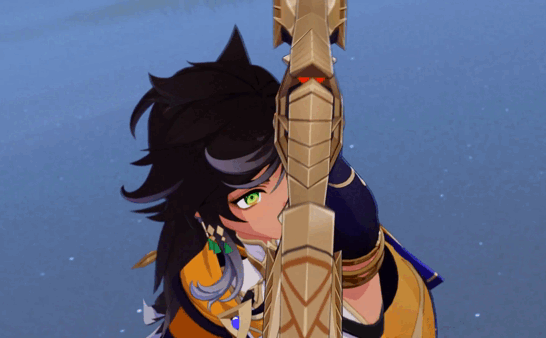
Sethos was a people person. He could talk to everyone and make them forget that they hadn't just met him, seamlessly integrating into any group he wished.
He had a good facial memory, so he could strike up a familiar conversation with most of the citizens.
But there was someone in Sumeru City that he had never properly caught for a chat. A humble cleaner girl, who seemed to hate him for some reason.
Whenever he tried to start a casual conversation with her, she focused on anything but him, her body language telling him she did not want to talk. Her replies were curt and he had to try hard to keep the conversation from dying.
He was pushy, yeah, but he knew not to push his luck. She was practically holding a weapon she could smack him with, after all. An everyman’s polearm - a broom.
So, he stopped approaching her. They just coexisted, him passing by her sweeping the streets sometimes, offering a polite wave as he jogged past her.
Then, on one rainy day, Sethos was caught enjoying the shower between his errands. He stood in the middle of the empty street, eyes closed and face lifted skyward as if to hug the rainfall.
But the rain suddenly stopped.
He opened his eyes in surprise and briefly met hers, before she handed her umbrella to him and dashed off. He was left there, staring at her disappearing form and the splatters of water as she ran.
He was confused, but shrugged the absurd encounter off with an amused smile.
“Heh, guess she doesn't hate me, after all. Interesting.”
Sethos loved being in the city. It was full of fascinating people, especially within the Akademiya. He loved learning about them, their stories, ideas and passions.
And now the curt sweeper girl had caught his interest.
He still politely greeted her when he passed by, and her responses were curt as ever, usually simply nodding and letting him pass. But now he read her behavior as shy and awkward instead of hateful.
His polite smile became a bit more genuine when he understood.
He kept noticing her in other places after that, too. She was often found sitting in random spots, holding a notebook she was very focused on, not paying attention to anyone who wondered what her deal was.
Sethos was one of them. He curiously eyed her every time he saw her, but she never lifted her face from her notebook.
One day she was sitting on a box behind Lambad’s Tavern, hand going wild as she worked on the notebook in her lap. Sethos noticed her, and decided to approach her for once.
She jumped when his voice cut through her concentration, having broken into her bubble.
“Soo. What’cha working on there?”
She immediately shut the notebook and looked away, clutching it to her chest.
“Heh, you were really into it. Sorry for spooking you.”
She didn't reply, no idea what to say, so she literally waved it off. He got the message, leaning against the railing next to her.
“You're a funny one, you know. I can never expect where you'll be sitting with that secret tome of yours. I’ve heard people call you a local cryptid because of it.”
That made her snort, and she immediately threw a hand up to cover her mouth.
His smile widened, proud of drawing a new reaction out of her.
“It's true, though. I've seen you on several branches of the Divine Tree, on a roof or two, and I swear I caught you behind a bush once. What's up with that?”
She scratched her cheek shyly, not expecting anyone to pay attention to her.
“...Inspiration���, she finally managed.
“Inspiration, eh? What's so inspiring about sitting behind a bush?”
She chuckled lightly in response.
“I just like switching spots. Different angles.”
"Riight, right, that makes sense. What do you need that inspiration for, then? Writing, drawing, homework?”
She turned the cover of the notebook towards him. It had ‘sketchbook’ written on it in fancy letters.
“Ohhh, an artist, I see. That's cool. You got the whole ‘vibe’ down too, now that I think about it.”
She drew the sketchbook back to herself again, shrugging with a small, amused hum.
“Quiet and mysterious. Who knows what's going on inside those covers”, he explained with a playful grin.
She was still curt, but her small smile gave him confirmation that she definitely didn't hate him.
“I’ll let you continue, then. Can't stop an artist when inspiration hits, after all.”
After seeing her nod and timidly wave at him, he stood back up with a satisfied smile. He waved in response and walked off, arms stretched behind his head as he went to continue on with his day.
From there on, he stopped to bother her for a moment or two whenever and wherever he caught her. She didn't seem willing to talk about art or her secret sketchbook, so he kept the conversation alive, talking about whatever. She was still curt and shy, but her snorts and amused huffs became a more common occurrence as days passed.
One day, after he was done telling one of his stories, she seemed particularly thoughtful.
“What's up? Remind you of something? Oh, oh, did I give you inspiration?” he grinned excitedly, pointing at her.
She took a moment to formulate her reply.
“..How do you always have something to talk about?”
He didn't expect that. She didn't seem annoyed, though..
“Heh, I’ve just seen and heard many interesting things. I like sharing mine, and learning more from the people I meet.”
“That simple?”
He shrugged casually.
“I’m a people person. I like talking and listening.”
Her face formed a strained smile as she looked away.
“My brain always goes blank when there's people around. It's like there's not a single thought in there.”
That seemed to confirm his assumption of her treatment of him before. She was just shy. Or socially anxious.
“Ah. More of an introvert, then?”
“...No, I want to be around people. I just… short circuit. Not very interesting company.”
“I think you're plenty interesting”, he stated matter-of-factly, “you've got me curious.”
That surprised her, and she turned to look in the general direction of his face, but still not meeting his eyes.
“You’re curious? About me?”
“Sure am. There's the sitting in random spots thing, your mystery book, how you're so focused you don't react to people gawking and talking about you right next to you…”
He counted with his fingers, amused but genuine.
“There's obviously a lot going on in there. I’m curious about what sorts of ideas you have. Art isn't exactly the biggest thing around the city, after all.”
She had to take a moment to take in his words.
“It's nothing special, really. Just stories, imaginary situations and encounters.”
“A bit of fantasy added to the ordinary, eh? That's fun. Care to give me an example?”
A bit nosy, maybe, but he was interested.
She looked away for a moment, not sure if she should or whether she even could produce an example for him. He seemed genuinely curious though, so she tried, and inspiration hit when she gazed down at the docks.
“Um, like, a long-awaited reunion happening down there. A tearful embrace…”
She suddenly felt very embarrassed.
“..That's dumb, isn't it? I can-”
“No, no, no, don't worry. I can see it. A bit of a romantic, aren't you?”
She blushed a little, but shrugged with a noncommittal chuckle.
“Comes with the whole art thing, I think.”
“Heh, makes sense. I like it.”
A moment of silence. It was comfortable to him, but she felt the need to fill it.
“U-um, thanks, for, you know, always talking to me.”
He wasn't expecting that, either, and hummed in question, grinning curiously.
“...I like talking to people. It's just..difficult”, she continued, wanting her thanks to reach him properly.
“Well, I’m always down for a chat. I'll keep stopping by to bother you, then?”
“You aren't bothering me. But yeah. I'd like that. Maybe I’ll learn some tips and tricks from the master of social skills”, she joked with a soft smile.
“Sounds like a plan.”
And so they continued their occasional chats. He often ended up stopping people to talk with them, anyway, but it was nice to have confirmation that he actually wasn't bothering her.
His company gradually helped her relax and learn to imitate some of his social techniques, like asking questions and using more open body language.
Eye contact was still an issue for her, though. And to Sethos’ surprise, it bugged him a little.
He was straightforward and social, so eye contact came naturally to him. Not everyone he talked with looked back into his, so he knew it wasn't easy for everyone. And, to be fair, his eyes were kind of intense, which was a blessing and a curse sometimes.
Yet, somehow, he couldn't shake the thought of wanting to meet her eyes. She was always looking somewhere else when they talked. Usually her sketchbook.
Still, he didn't want to make her uncomfortable, so he did his best so she could relax when they chatted. He wouldn't push her, make her feel like she had to do it.
He had only met her eyes once, by accident that time she handed him her umbrella. They were bright and curious, almost striking in the muddiness of the downpour.
He remembered them clearly.
So, instead, he focused on learning more about her and her ideas and visions, and loved telling her his stories since they seemed to inspire her to some extent.
He learned to pick up on the change in her expression when she moved from listening to him to formulating an idea.
It was cute.
He thought positively about people, appreciated their qualities, both inside and out, but it wasn't often that he considered a person cute.
That thought lingered in his mind, too.
Her reactions made her even more cute to him. She blushed at times, yes, but she was playful in return, smacking him with her pencil or broom or rolling her eyes with that amused smile of hers. And she gladly showed him her work now.
He didn't think it affected how he interacted with her, but he unconsciously became a bit more friendly, almost flirty at times. He often grinned when they talked, initiated playful physical contact - like poking or gently kicking her - and couldn't help but give her tons of honest compliments, especially on her art.
One time after their brief chat when she was working, he was left with a single thought in his mind:
“Heh, shucks. I like her.”
It wasn't a world changing revelation, just made him connect the dots and realize how much his way of interacting with her had changed.
…And he was pretty sure she liked him too.
He kept interacting with her like usual, honestly just enjoying what they had. A comfortable friendship with banter, intrigue and plenty of laughter.
But it would be a lie to say that he wasn't also gauging more on what she could be feeling.
He picked his best stories, told them with a bit more flair, and gave her more casual compliments.
And, well, if their knees happened to touch when they were talking, or his playful pokes lingered on her skin a moment too long to be read as platonic, he didn't make a big deal out of it.
One day Sethos caught her sketching on a sturdy branch of the Divine Tree, easily accessible but not immediately visible to the townsfolk.
He chuckled and approached her, nimbly making his way to her in the tree.
“You're an enigma, you know that?” he grinned as he sat down next to her.
“It’s simple, really. The view is great from here. So many people to see, so much inspiration to gather.”
He looked down. The citizens were enjoying their evening activities; entering and exiting the tavern, boats docking, adventurers returning to get their rewards for their daily commissions.
It was interesting. He preferred to be mingling down there with them, but stepping back and watching the hustle and bustle from a different angle made him appreciate it in a new way.
He might not have lived in the city for long, but watching all those people do their thing made him realize how lucky he was to be around so many people nowadays. He grew up in the desert, with only the people of the temple as his company, after all.
He was gazing down with a gentle and slightly solemn expression, happy to be where he was now. He had friends, connections, and now… her, too.
He turned to look at her, about to share his appreciation for the view too, but to his surprise, he met her eyes. She had been watching him, curious about how quiet he went and what he was thinking of.
Her eyes held a hint of worry, but enough affection to make him stumble with his words. This time it was Sethos who broke eye contact, turning to look back down.
“Y-yeah. I get it. All those people have their own lives and stories to tell.”
“Exactly!” she chuckled and pointed the end of her pencil at him. “A gold mine of inspiration and ideas.”
They both loved getting ideas from people, huh? Their ways were different, sure, but maybe they were pretty similar, after all.
Stories, curiosity, ideas and inspiration. They worked well together.
That train of thought suddenly made him feel the need to communicate his feelings to her. Like his soul was calling out, wanting to connect with this girl whose company he had been enjoying more and more.
“You know, you remind me of the Moon sometimes”, he started, fittingly artistic for what he was about to do.
“Sounds fun and poetic. Care to elaborate?”
“You're always present, I just gotta know where to look. Mysterious, but mesmerizing.”
“Hehe, thank you.”
She smiled, but didn't seem to catch the full meaning of his words, so he continued.
“What I’m trying to say is, I like you. You draw my attention in a way no one else does.”
Well that definitely caught her attention.
Their eyes met again, and he nodded, not ashamed or embarrassed, but ever so slightly nervous.
“You do?”
She cleared her throat to answer him.
“...I always thought you were like the Sun. You're warm, fun, and easily draw people to you.”
She wasn't as calm as he was, but hoped her indirect poetic message reached him too.
“Does that mean what I think it does?” he couldn't help but ask, a hopeful grin on his face.
She moved her gaze down and nodded.
“I-I like you too. I feel like I can relax around you.”
Both sat in silence, soft and giddy grins on their faces, taking in the big words hanging in the air.
They turned to look back down at the citizens buzzing around the streets, the shy mood eventually becoming comfortable again, and moved on into imagining what kinds of adventures the people below them had experienced today.
Their fingers soon found each other and intertwined slightly as they sat together.
#sethos#sethos x reader#genshin impact#genshin impact x reader#genshin x reader#SDB fics#it happened huh#i wrote genshin fanfiction#life has a funny way of making things happen#but anything for my boy <3 (thats practically what the file is called lol)#anyway hope yall like it!!#edited a bit so the spaces aren't as big lol#hopefully it looks better and still reads well
149 notes
·
View notes
Text
A (Negative) Review of Tom Taylor's Nightwing Run - What Went Wrong? Dick's Characterization
Introduction Who is Dick Grayson? What Went Wrong? Dick's Characterization What Went Wrong? Barbara Gordon What Went Wrong? Bludhaven (Part 1, Part 2) What Went Wrong? Melinda Lin Grayson What Went Wrong? Bea Bennett What Went Wrong? Villains Conclusion Bibliography
In the previous section, we explored not only who Dick Grayson is and why he is so beloved by his friends, but why many people — including Taylor and others at DC — have a hard time understanding his character. By reducing Dick to a hero who is “good” and transforming into an “everyman” that anyone can project themselves onto, Taylor fundamentally removes that which makes Dick special, transforming him into a different character.
But there are other ways in which Taylor and DC mischaracterize Dick by erasing his history and transforming into a more “palatable” mainstream hero. That is what I wish to explore in more detail now.
Let’s begin by examining how Taylor’s framing Dick’s story in Nightwing (and that of the Titans in Titans) as a coming-of-age tale contributes to a grand erasure of Dick Grayson’s greatness.
In Taylor’s run, Dick is treated as if he were a new superhero. However, even if this run (not the entire title that started in 2016 with Rebirth, but just Taylor’s run) were to become a new stand-in for the 1996 Nightwing solo in which Dick arrives in Bludhaven for the very first time, Dick Grayson should not be portrayed as someone new to vigilantism. Even if one were to generously interpret Taylor’s Dick as being only twenty-two years old after starting as Robin at twelve years of age and only recently having become Nightwing, Dick would still have a decade of experience doing detective and hero work. It is notable that most of that decade was spent with him leading the Titans, serving as Batman’s partner and second-in-command, and mentoring numerous young heroes.
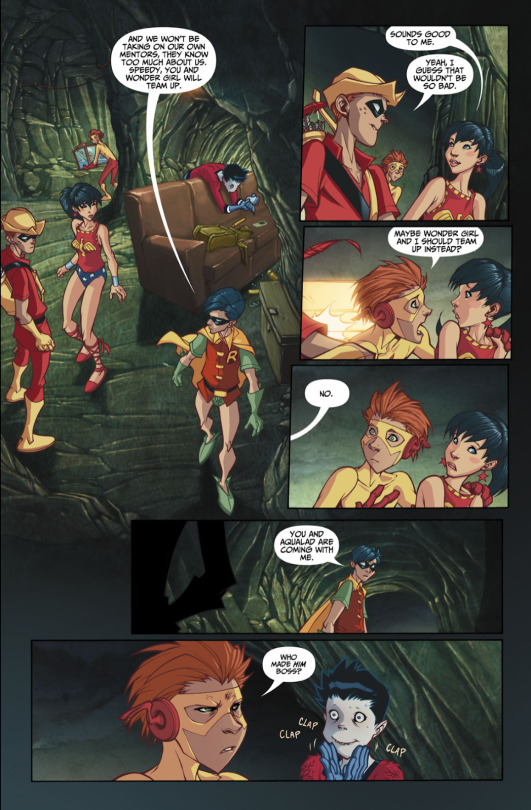
(Wolfram, Amy, writer. Kerschl, Karl, illustrator. In the Beginning… Part Three. Teen Titans: Year One no. 03, e-book ed. DC Comics, 2008. pp. 09)
One of Dick’s core traits is that he is a natural, if at times reluctant, leader. Many key moments in his character history are defined by Dick feeling the weight of the responsibilities placed upon him and having to push through his personal reservations for the sake of others.
Dick was the first child hero. He was the first sidekick. Out of universe and in universe. (In the introduction to ��Dick Grayson, Boy Wonder: Scholars and Creators on 75 years of Robin, Nightwing, and Batman, Kristen L. Geaman mentions that some argue Mister America from Action Comics #2 is, in fact, the first side-kick. However, this claim is debated since Mister America played more of a comedic and “Watsonian” role [as Dick Grayson Fan C suggested], and Dick was the one who popularized the formula of the role.) He was the proof that the concept of a sidekick — a partner — could work. Proof that kids could be trained into this life. Proof that they did not need powers in order to be a hero. That is one of the reasons why, in-universe, he is admired by so many characters – because he is the trailblazer who opened the doors for every young hero and side-kick that came after him. Dick’s history is also why he has so many connections — it is because he was the one who opened the doors for everyone else, mentored so many people, and partnered with those who were his age and those who were much older that he gained so much respect in the superhero community.
And yet, that history is called into question in Taylor’s narrative when he frames Dick as a young, new hero who is just beginning to assess what he wants to do with his life. Not only is it bad storytelling to portray Dick’s connections without factoring in the experience tied into them, it also demonstrates a fundamental lack of understanding of who Dick is, what he represents, and why he’s been so beloved for over 80 years.
This lack of appreciation and of respect towards Dick is extended to the other Titans in Taylor’s Titans (2023) run. As he himself pointed out, the first arc is called Out of the Shadows because, in his words, the Titans are “stepping out of the shadows of the Justice League.”
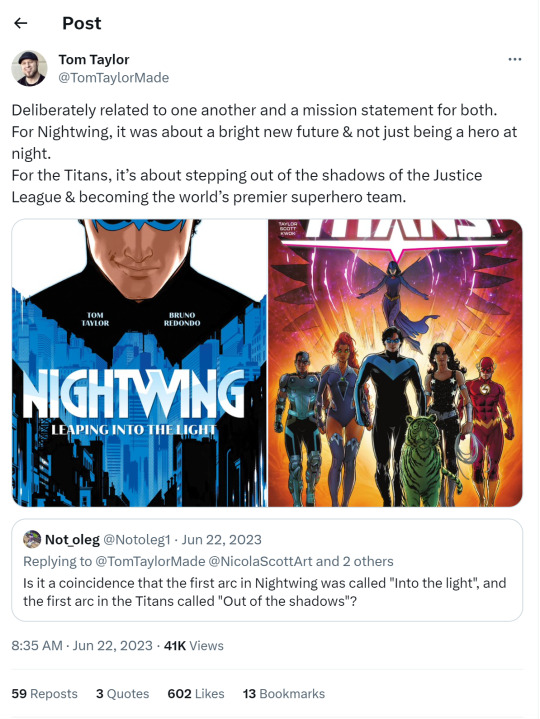
(Taylor, Tom [TomTaylorMade]. Twitter, 22 June 2023, https://twitter.com/jesswchen/status/1636971185782259716?s=20.)
And yet, to its fans, the Titans were never in the Justice League’s shadows. They were not inferior or subordinate to the Justice League, even if they may be less known. In-universe, the Titans may have modeled themselves after the Justice League and they may be allies, but the Titans are still an independent entity. From their very inception they defined themselves in contrast with how the Justice League operates.
In fact, in JLA/Titans #02, Dick himself draws this distinction when arguing with Bruce and calling him out on his condescending behavior towards the Titans.

(Grayson, Devin; Jimenez, Phil, writers. Jimenez, Phil; Brown, Eliot R., illustrator. The Generation Gap. JLA/Titans no. 02, e-book ed. DC Comics, 1998. pp. 23)
Trying to repackage Dick and the Titans as newbie heroes who are only now experiencing independence demonstrates a lack of understanding of their history and who the Titans are meant to be. The Dark Crisis and The Dawn of the DCU attempt to frame Dick’s Nightwing series and Titans as coming-of-age tales, where only now the characters are stepping into adulthood. Taylor’s writing goes a step further and portrays them as making rookie mistakes, coming across as newbies, and as a result, erasing all of the rich history that have built these characters into who they are today.
As I mentioned above, even if we generously interpreted that Dick never lived in Bludhaven before, Dick should still have plenty of experience being a hero and living on his own. The moment in which he transitions from Robin to Nightwing (willingly or unwillingly depending on your preferred Nightwing origin story) is Dick’s coming-of-age moment. By the time he comes to Bludhaven, Dick already knows who he is, what he wants, and he knows how to care for himself. By the time Dick comes to Bludhaven, his internal struggles are not that of a young adult who just left the nest and does not yet feel like an adult, but rather that of an adult who knows his own abilities and is confident in who he is.
And yet, in Nightwing #84, the first issue in Nightwing: Fear State, Taylor has Dick pondering on the responsibilities of taking care of Bludhaven. Right on the first page, he says “Fighting an entire corrupt system? Saving a whole city? There’s no training for that.”
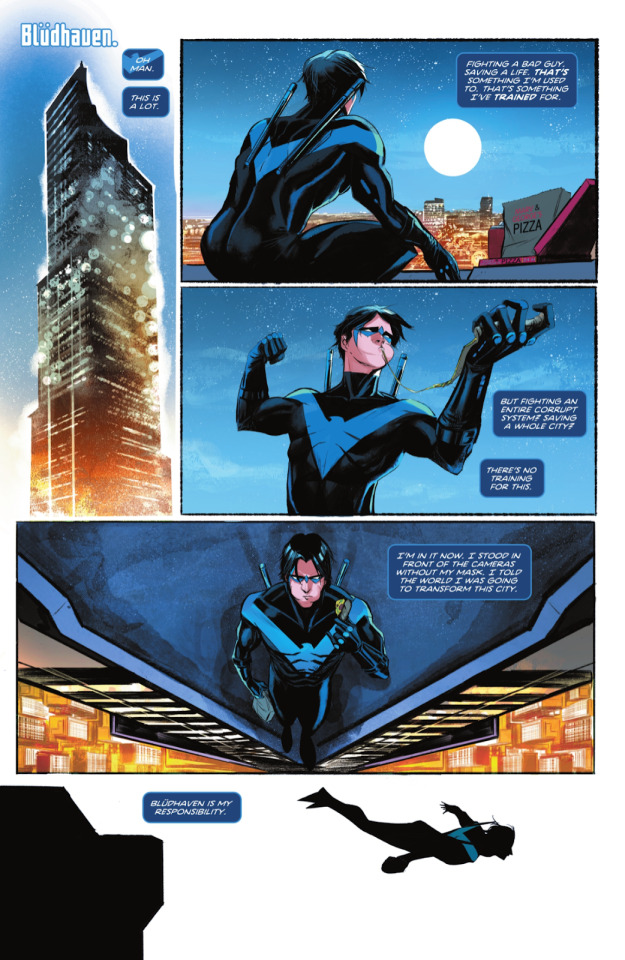
(Taylor, Tom, writer. Rodriguez, Robbi, illustrator. Fear State Part 1 of 3. Nightwing: Rebirth. 84, e-book ed. DC Comics, 2021. pp 03)
Except even the most basic knowledge of Dick’s character shows that he was, in fact, trained to save an entire system and to fight a corrupt system — he was trained to care for Gotham and to take out the corrupt systems that prevail in that city. Not only that, Dick has also been Batman, at which point he was also Gotham’s main protector.
This mistake becomes even more outrageous when one considers that, though Taylor’s run is at times treated as a soft-reboot, Dick is still shown to have lived in Bludhaven while operating as Nightwing. This means that that generous interpretation I’ve been alluding to is not, in fact, compatible with the story as it is written. It is a falsehood, and therefore cannot be used to excuse the “new-in-town” approach Taylor uses when writing Dick.
Dick’s apparent inexperience and, frankly, incompetence, is further highlighted by the amount of times Dick is saved by others, or the amount of times when he is dependent on others to do the work for him. These instances include, but are not limited to:
The people of Bludhaven answering Nightwing’s call when Heartless sets the tent city on fire in #81
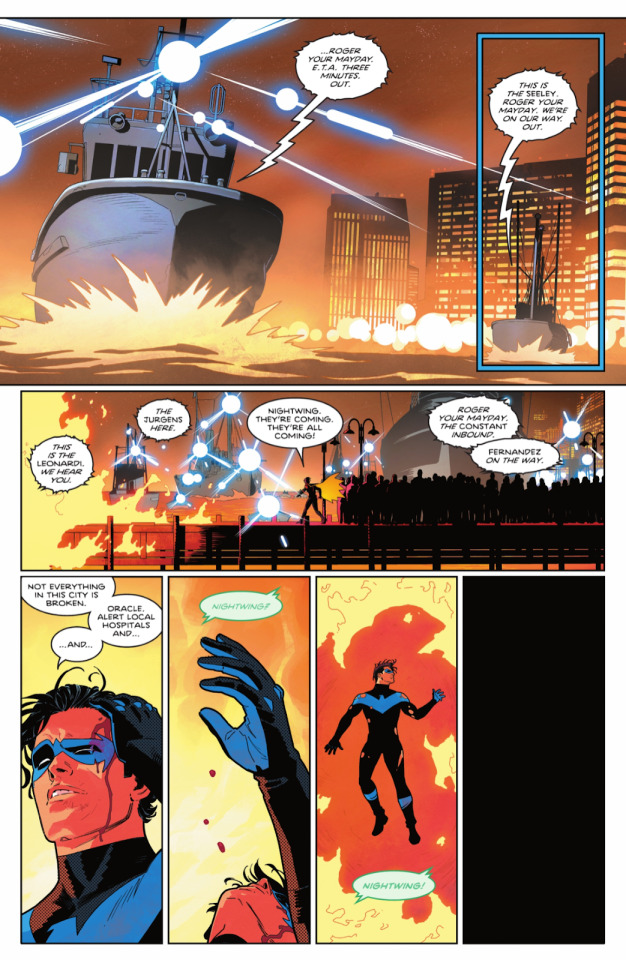
(Taylor, Tom, writer. Redondo, Bruno, illustrator Leaping into the Light Part 4. Nightwing: Rebirth. 81, e-book ed. DC Comics, 2021. pp 13)
Dick being knocked out with a single blow and then unmasked during his first attempt to investigate Melinda also in issues #81
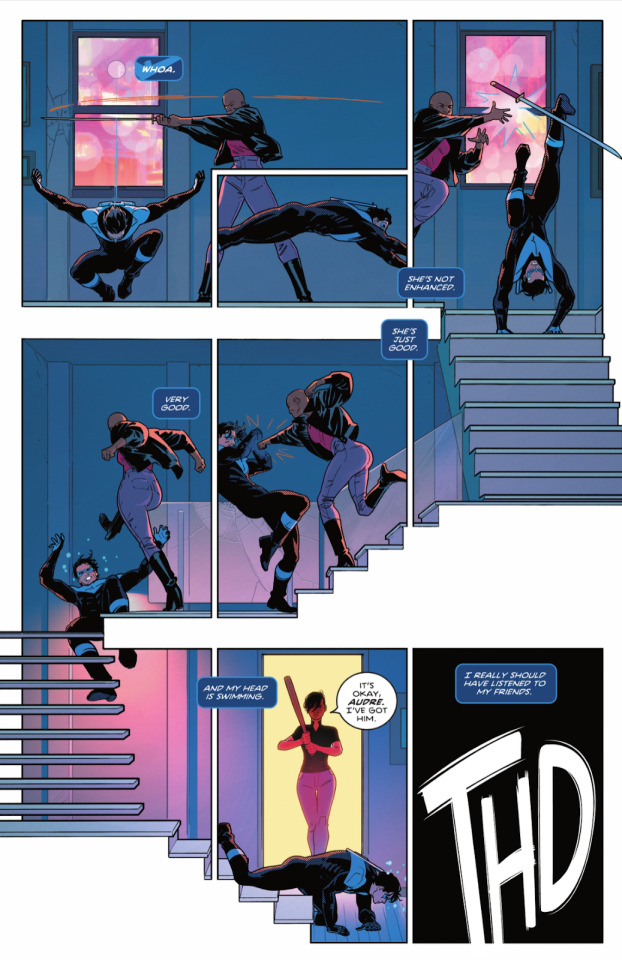
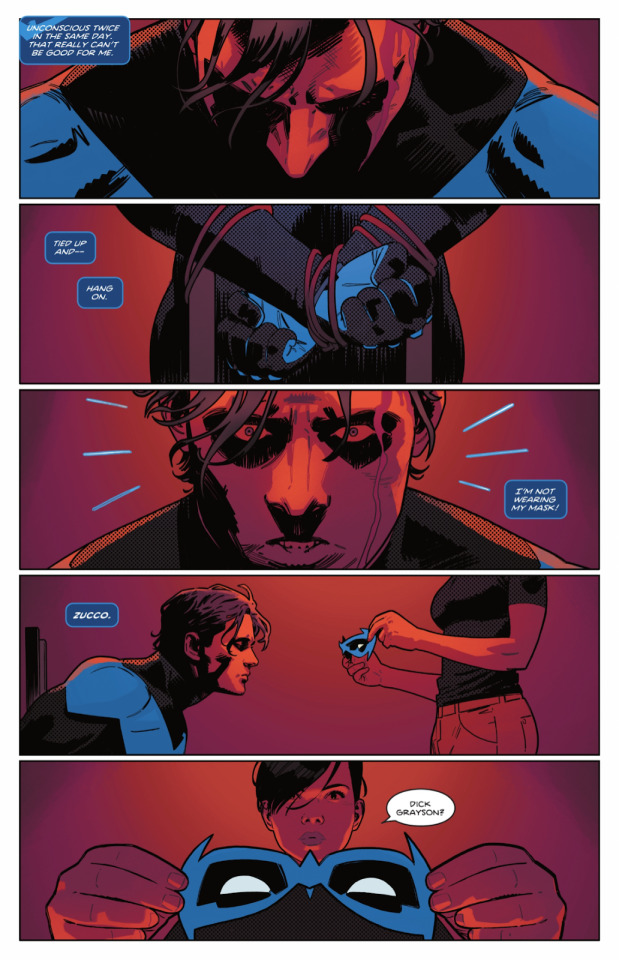
(Taylor, Tom, writer. Redondo, Bruno, illustrator Leaping into the Light Part 4. Nightwing: Rebirth. 81, e-book ed. DC Comics, 2021. pp 20 - 21)
Babs calling people to Dick’s rescue rather than trusting he could get out of it on his own in #82.
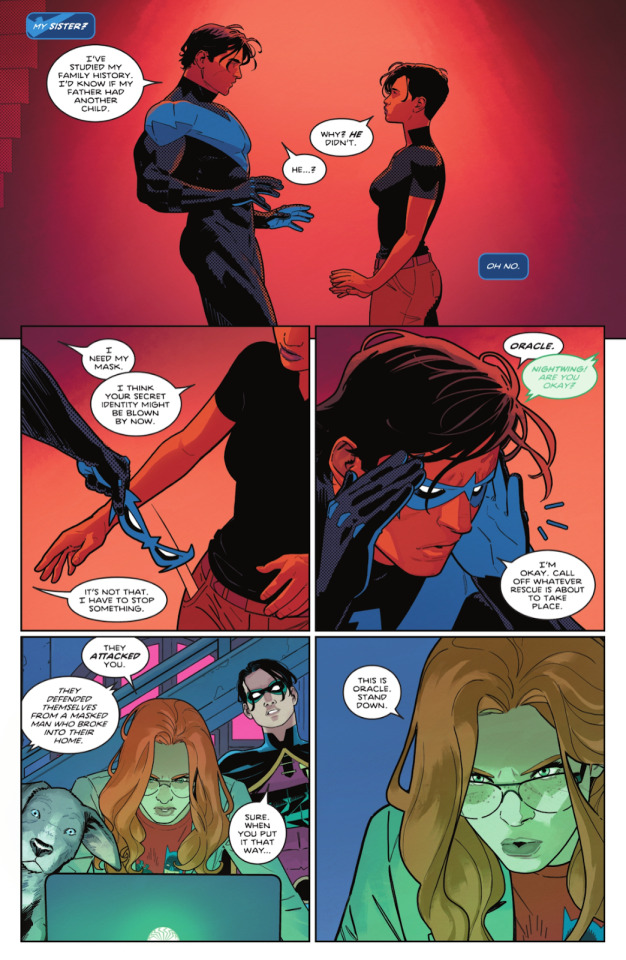
(Taylor, Tom, writer. Redondo, Bruno, illustrator. Leaping into the Light Part 5. Nightwing: Rebirth. 82, e-book ed. DC Comics, 2021. pp 03)
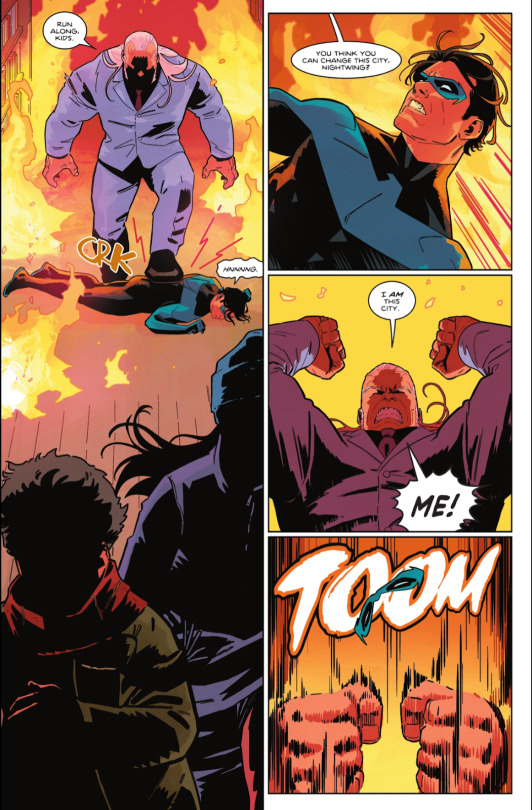
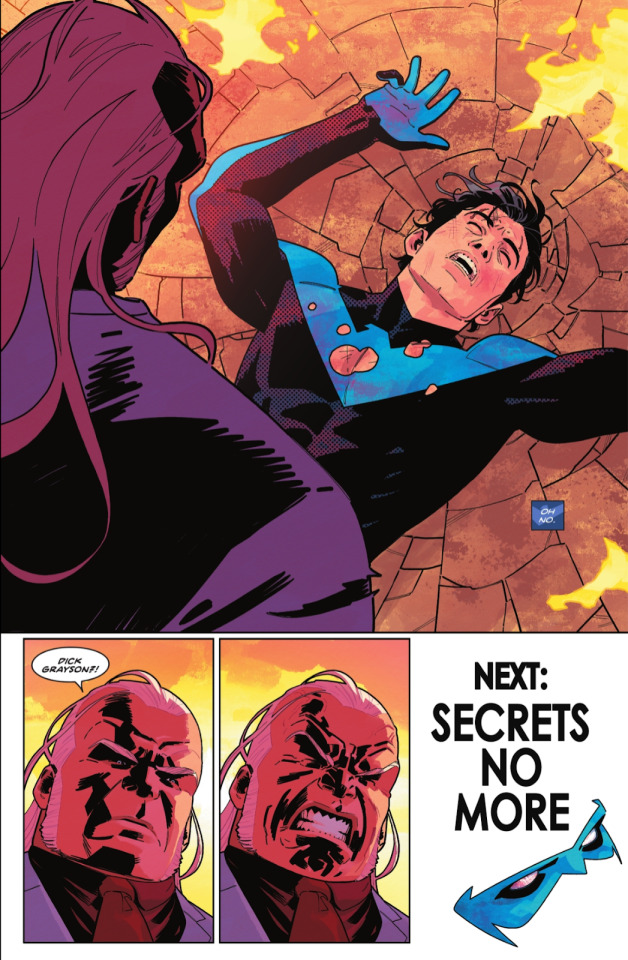
(Taylor, Tom, writer. Redondo, Bruno, illustrator. The Battle for Bludhaven’s Heart Part Four. Nightwing: Rebirth. 95, e-book ed. DC Comics, 2022. pp 24 - 25)
In #90, when his building blew up and Wally came to save him, then proceeded to force him to rest away from Bludhaven instead of letting him take action.
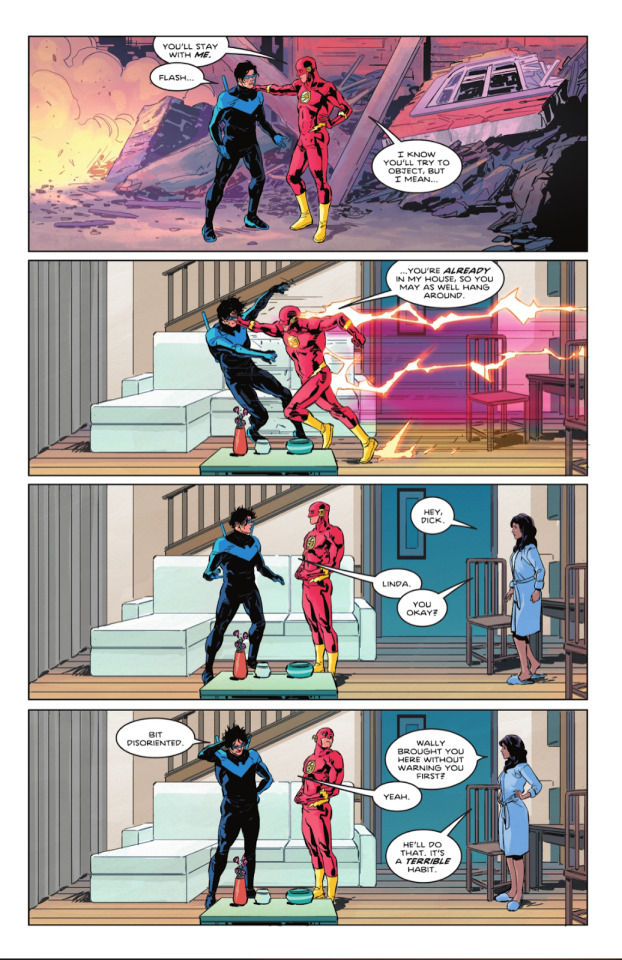
(Taylor, Tom, writer. Redondo, Bruno, illustrator Get Grayson Act Three. Nightwing: Rebirth. 90, e-book ed. DC Comics, 2022. pp 15)
And needing Babs’ help during a car chase in #106,
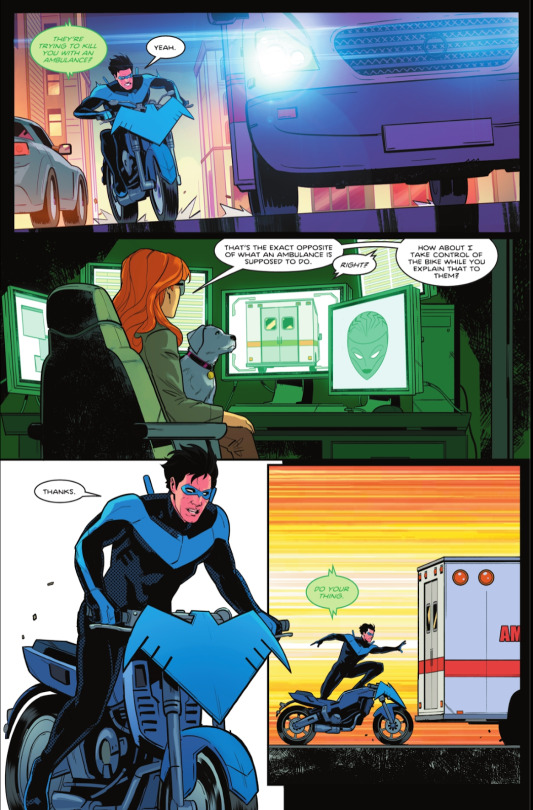
(Taylor, Tom, writer. Byrne, Stephen. The Crew of the Crossed Part One. Nightwing: Rebirth. 106, e-book ed. DC Comics, 2023. pp 16)
Which greatly contrasts how, in #113 of the Nightwing (1996), Dick handles a similar situation while simultaneously mentoring Rose Wilson.
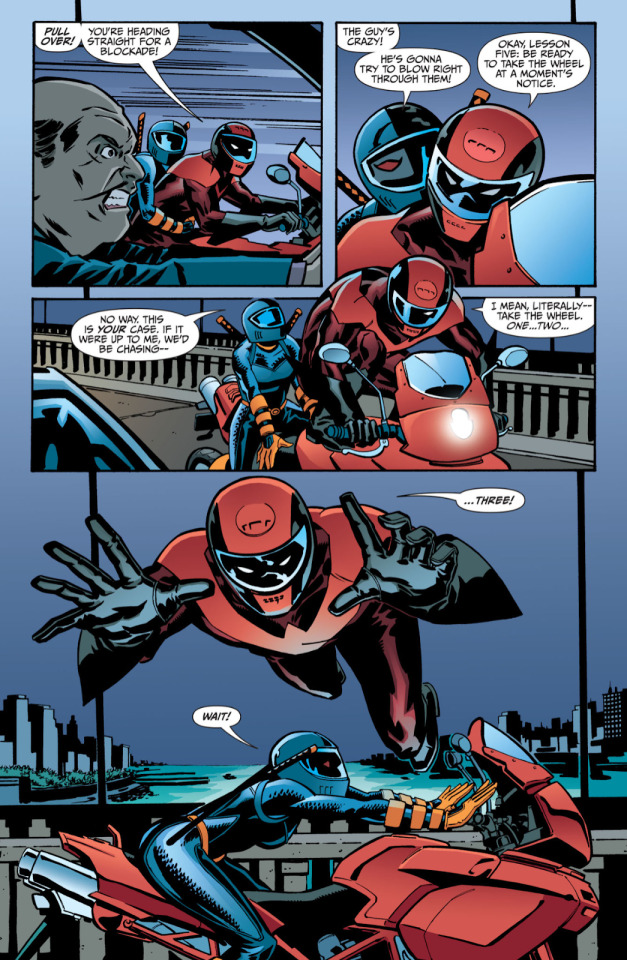
(Grayson, Devin, writer. Chian, Cliff, illustrator The Scorpion and the Frog. Nightwing no 113, e-book ed. DC Comics, 2005. pp. 19)
The thesis of Taylor’s run is that people need to rely on one another — we have to be each other’s safety net. And while that is an interesting theme to explore and one that certainly speaks to Dick’s history of doing things on his own out of fear of putting others in danger, Dick should still, more times than not, be able to do things by himself. After all, this is not an ensemble piece — this is Nightwing’s story and as his fans, we want to read about him. Cameos are fine. They can be fun, in fact. But cameos are different from Dick constantly struggling and needing help whenever he faces a challenge – the former portrays Dick as someone with powerful connections that deeply love him; the latter portrays Dick as being incapable of doing things without someone holding his hand.
This is another thing that Waid understands about Dick and portrays it clearly in World’s Finest. When Kara explains to Clark what first attracted her to Dick, she emphasizes how, despite the fact he had no powers, he could still save himself.
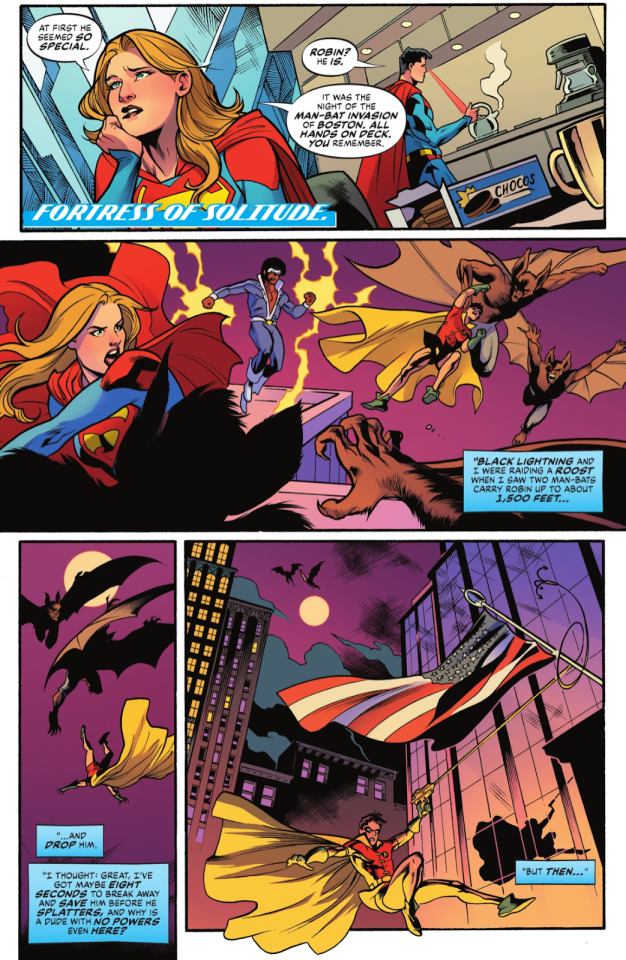
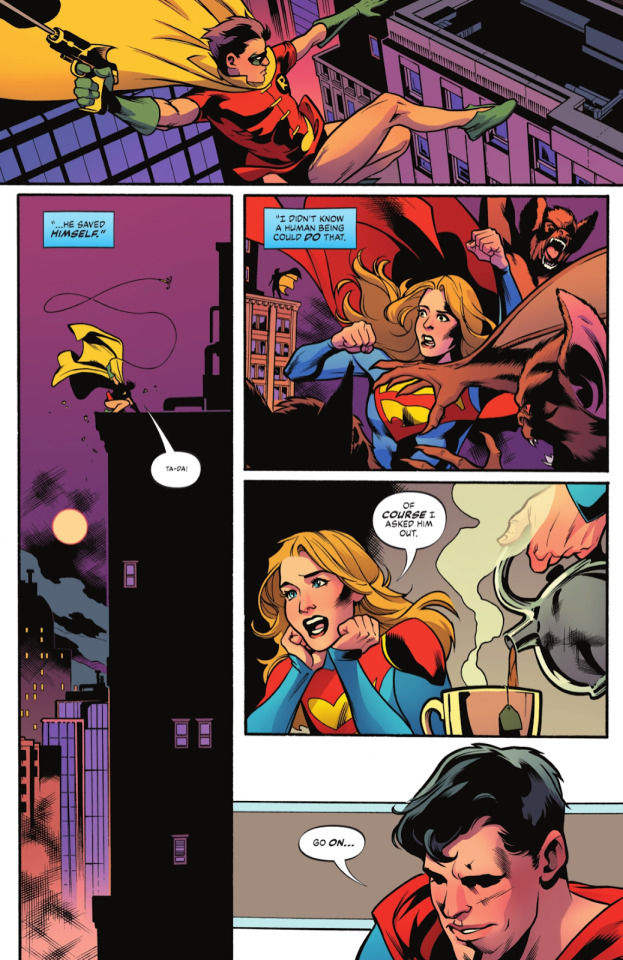
(Waid, Mark, writer. Lupacchino, Emanuela, illustrator. Scream of the Chaos Monkey. Batman/Superman: World’s Finest no. 12, e-book ed. DC Comics, 2023. pp. 06 - 07)
Being not just competent, but exceeding even the highest expectations is at the core of Dick’s character. And, as was pointed out in the previous section, it also serves to feed into his toxic perfectionism — he is one of the top tier heroes, therefore people expect excellence from him. Dick does not want to fail those who put their trust in him, and so he demands perfection of himself to the point of self-destruction.
Beyond that, we cannot give Taylor credit for trying to tell a story about Dick growing out of his perfectionist bad habits by learning to rely on others. After all, if Dick is constantly asking for help, then he is not resisting help. And that removes his chance for growth. A character arc requires development and change, which means one cannot start at the endpoint. Therefore, it cannot be claimed that Taylor’s intentions are for Dick to learn to rely on others, for he has been doing so without hesitation since the beginning.
As a result, the story is not about Dick being Bludhaven’s safety net while learning that he also has a safety net of his own, but rather about Dick always relying on his safety net, always knowing it was there, and having them also shoulder the responsibilities he took when he named himself Bludhaven’s protector. There is no room for Dick to grow because he is already at the end of his journey. And there is no room for Dick to be the hero of his story because others are constantly coming to his rescue when things get too difficult.
Once more, I must clarify that I’m not saying that Dick is not loved, or that Dick is not important to many people. I’m simply stating that the way his relationships are built gives him very little room to rely on them. He is their safety net but he doesn’t trust them to be his safety net. Exploring this requires going into the nuances of each relationship, where conflicts are created, and where people hurt the other in the heat of an argument. It would mean dealing with the messiness of complex human emotions, forcing characters and the audience to sit with uncomfortable feelings as we get to the root of Dick’s perfectionism and his fears.
In June of 2022 a reader on Twitter asked Taylor about his decision to have Dick constantly falling, for, as they pointed out, this makes Dick look incompetent.
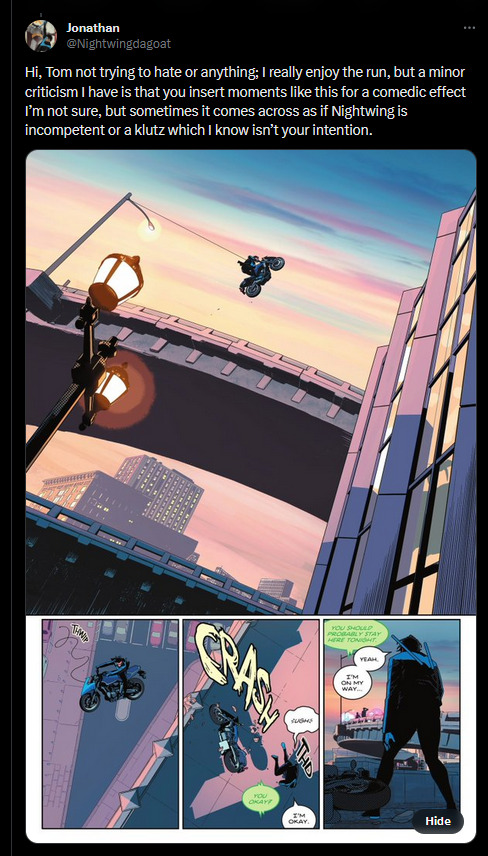
(Jonathan [@Nightwingdagoat]. Twitter, 21 June 2022, https://twitter.com/Nightwingdagoat/status/1539267708310765568)
Taylor responded by saying that these instances were Redondo’s call, and that it was their attempt to humanize Dick.

(Tom Taylor [@TomTaylorMade]. Twitter, 21 June 2022, https://twitter.com/Nightwingdagoat/status/1539267708310765568)
In fairness to Taylor, the following criticism will then be directed primarily at Redondo who believed these instances were the best way to “remind people that Nightwing is human.” That being said, as Taylor appears to support such a position, and as he has written numerous incidents where Dick is conveniently knocked over by others, I do believe this can be directed at him as well.
Simply put, to have a character constantly fall is a superficial and lazy way to humanize said character. Casual falls like this, after all, are not failures. They contribute little to the story and have very little consequence.
Nothing happens once Dick falls. The bad guy doesn’t get away, the innocent civilian is not hurt, the crucial piece of evidence needed to crack the case is not destroyed. There are no lasting consequences for Dick to deal with, no conflict that can arise from these falls, no tension to make Dick’s future success more emotionally effective. Furthermore, these falls are completely out of Dick’s control, taking away any responsibility he might have for his mistakes.
If the flaws that are meant to “humanize” Dick are falls which he bears no agency over, then he, the good guy, has no responsibility over his own “failures.” Said “failures” also end up having no consequences to the plot, which gives Dick no crisis to respond to (furthering his passivity), and this robs Dick of character development opportunities.
It creates a stasis in the story where the only conflicts Dick faces are the ones against really bad guys that always – always – lose to Dick and his connections, and ones which do not ask for moments of introspection.
Despite almost never falling in The Untouchable, Dick is far more human there than in Taylor’s and Redondo’s run. This is because Dick is forced to face the consequences of his “failure” to capture the Judge twice in the past. Dick is constantly thinking about the Judge’s victims, forcing himself to carry their lives on his shoulder. He pushes himself to toxic lengths. Whenever the Judge escapes his grasp, the conflict evolves, the stakes are raised, and the tension builds. Dick’s desperation becomes visceral to the reader, and that is what humanizes him to the reader. Similarly, the emotional pay-off of the climactic battle in the end grows with each obstacle Dick faces.
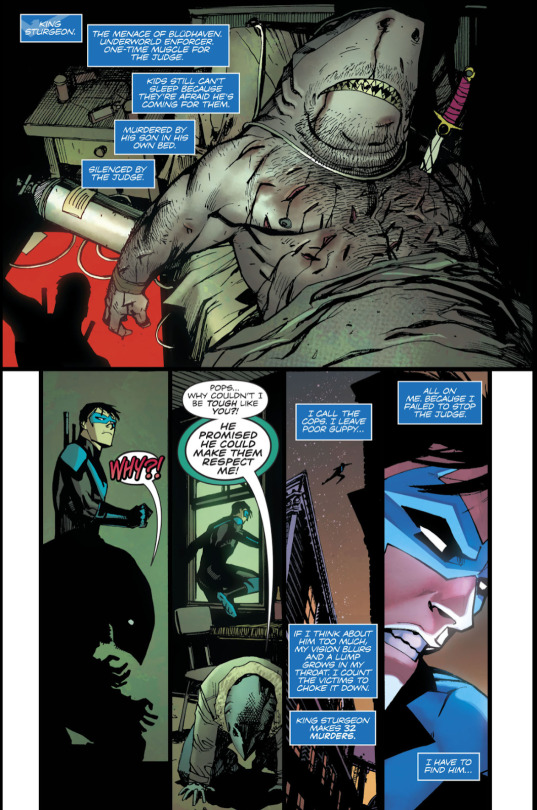
(Humphries, Sam, writer. Chang, Bernard, illustrator The Untouchable: Chapter Four: Infiltration. Nightwing: Rebirth no. 38, e-book ed. DC Comics, 2018. pp. 09)
But Dick’s newbie incompetence is not the only way Taylor mischaracterizes Dick. It is by combining the lighthearted tone of his story, his depiction of Dick as a blank canvas “good guy,” his avoidance of conflict, and his attempts at answering difficult real-world problems that Taylor ends up creating a version of Dick Grayson that is utterly self-absorbed and lacking in foresight.
Telling and not showing is an immense problem in Taylor’s writing. There’s a difference between how a writer attempts to portray a character and how, given their actions in the context of the narrative created, the story shows them to be the complete opposite. In such cases, the story triumphs over the writer. This is why I claim that, though Taylor tells the reader that Dick is caring, intelligent, and a hard worker, he actually shows Dick as as selfish, incompetent, and naive.
Take, as an example, how Taylor sidelines the Heartless storyline in favor of slice-of-life scenes. If Heartless was not there, perhaps those sweet moments could be just that. However, as in the world of the story there is currently a serial killed running around free, making orphans out of the youth Dick vowed to protect, the fact that Dick is not constantly working to catch Heartless is not only out of character, it makes it so it seems he doesn't care what happens to the people of Bludhaven (And now also Gotham, given #111, which was released as this essay was being edited). Rather than stopping crime and bringing justice to Heartless’ victims, Dick would rather spend his nights in his apartment, enjoying a relaxing evening with his girlfriend and his dog.
Please do not take this to mean that I consider a slice-of-life story to be inferior to other genres. My reason for highlighting this is not to undermine the value of slice-of-life, but rather to argue that such scenes do not live in isolation. They exist within the context of a larger narrative, and what would be sweet in a sitcom-style story comes across as something entirely different when other characters are facing life-and-death stakes. It does not matter how much the writer tells us that these characters are caring and compassionate — their lack of action and urgency portrays them as self-centered.
Just as Taylor attempts to write the big climatic moments without properly building the momentum necessary to make them impactful, he similarly forgoes the work required to win the reader’s trust, and instead expects his audience to simply accept that important plot and character developments are happening off-screen. Rather than letting the audience experience the intrigue and devastation of the Heartless mystery by showing us how the horrors of these murders motivate Dick to continuously search for this cruel killer, Taylor instead advances these elements off-screen, opting instead to tell the reader they’ve occurred.
That is not to say that writers cannot streamline plots. They absolutely can and, in some cases, they absolutely should. However, streamlining a subplot is a far more complicated matter than just telling the reader said events happened off-screen and expecting them to simply accept it.
While it is impossible to provide a precise checklist with the step-by-step guidelines on how to properly streamline a subplot, I believe one of the factors one must consider is whether that plot should be streamlined or not. Personally, I believe that Dick investigating the character who was meant to be this run’s main villain is too big and too important of a story to be played off offscreen.
Dick has hardly spent any time attempting to apprehend Heartless. Instead, as time of writing, his investigation of Heartless has practically nonexistent. Instead, after not focusing on him for the majority of the run, we are simply told by Dick and Babs that they’ve been keeping an eye on Heartless, even if their investigation is never shown to us.
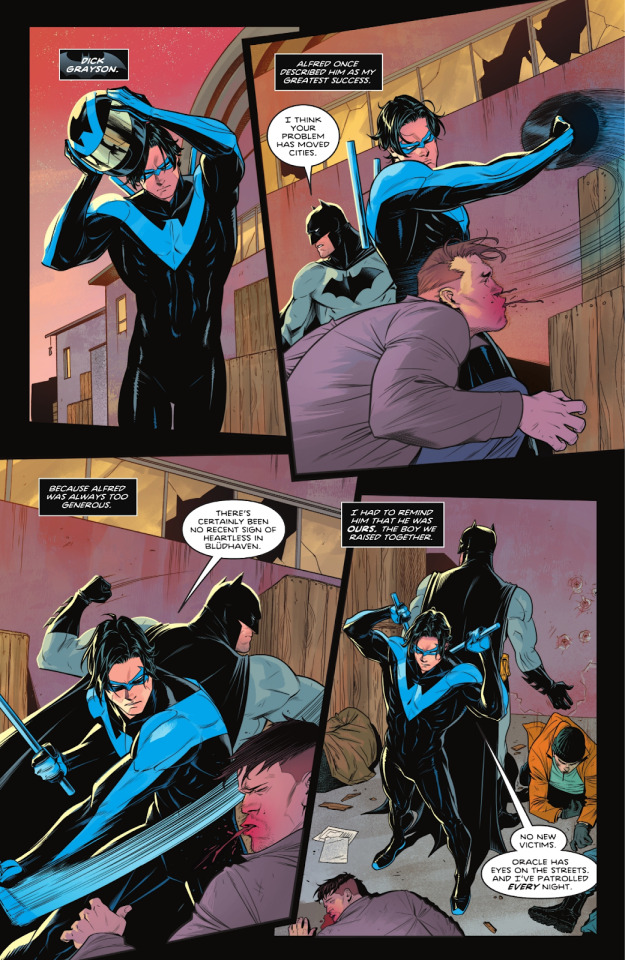
(Taylor, Tom, writer. Basri, Sami Nightwing. Nightwing: Rebirth. 111, e-book ed. DC Comics, 2023. pp 09)
If we, as readers, are to believe that Dick is the selfless detective and hero — the Heart of the DCU — that Taylor tell us he is, then finding and apprehending Heartless should be one of his top priorities. If Heartless was meant to be Nightwing’s big nemesis, then their confrontation should always be a source of great tension and conflict. Such importance would be demonstrated by showing Dick working towards stopping him at every moment he has free. But either those moments are not happening at all, or they are happening off-screen.
Having such an important conflict and such a crucial antagonistic dynamic develop does nothing to enrich the plot — in fact, it only detracts from them, for because we do not get to witness this relationship grow and we are only told that it is happening, the pay off that must come when Nightwing and Heartless finally have a big confrontation will be cheapened as a result.
Heartless' actions are so brutal and create such urgency that not prioritizing Heartless' arrest makes it seem like Dick doesn't care about his victims. Batman doesn't wait around when the Joker breaks out of Arkham – he hunts the Joker down. Similarly, Dick didn't wait around on the Judge – he hunted him down.
For Heartless to be the Big Bad, Dick should have put him in jail already and Heartless should have escaped. DIck should have faced him multiple times. He should have been Dick's priority because of how cruel and urgent his actions are.
Finally, there are three particular moments that I wish to discuss to illustrate how ambivalent Taylor is when it comes to Dick’s characterization, choosing to prioritize online discourse over who Dick Grayson’s established history and personality.
The first one comes from a throwaway line. And yet, because this was a throwaway line that demonstrated how little thought Taylor gives to his main character.
When Tim makes his first appearance in Taylor’s run in #80, Dick’s narration says that many would consider Tim to be the best Robin, and that he “totally gets it.”
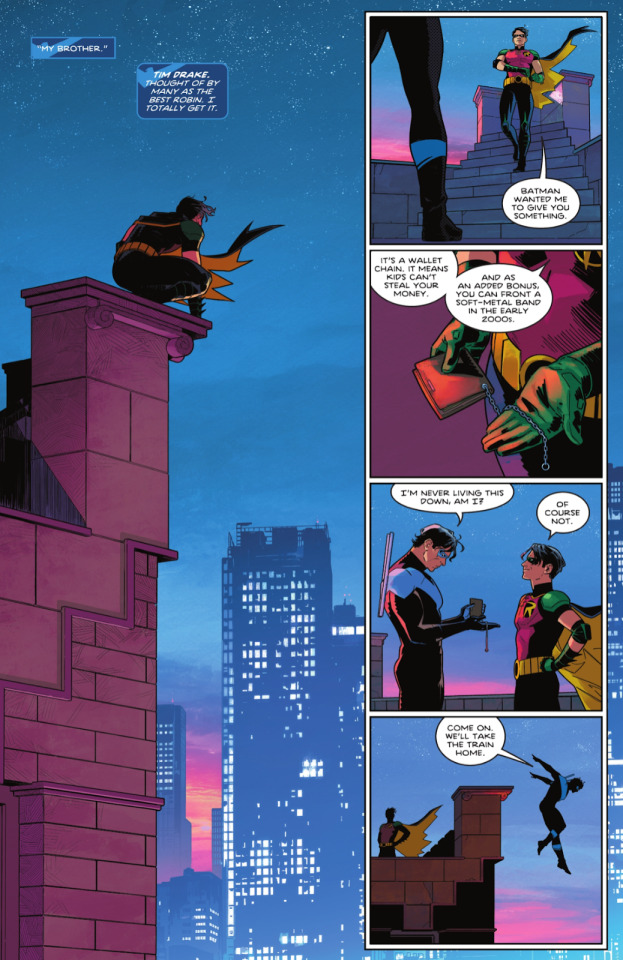
(Taylor, Tom, writer. Redondo, Bruno, illustrator. Leaping into the Light Part Three. Nightwing: Rebirth. 80, e-book ed. DC Comics, 2021. pp 09)
“Who is the best Robin” is a discourse that I, admittedly, care very little for. It serves no purpose other than to get fans to fight one another, bashing each other’s favorite characters in order to prop up their own. When posed on social media, this question becomes a thinly veiled attempt to generate high engagement. In reality, when people discuss “who is the best Robin,” they are, most often than not, truly arguing about who is their favorite Robin. But the question is framed in a way to be purposefully divisive, creating conflict within the fan community. The fact that DC plays into that divisiveness that requires their characters to be brought down so others can be lifted up for marketing material is concerning, but the fact that writers such as Taylor are letting that fan perception bleed into in-universe narration is nothing less than lazy writing that prioritizes online leaning into buzz over good storytelling.
Naturally, as a Dick Grayson fan my opinion is that Tim is not the best Robin. Dick is. But my problem is not that Taylor said that Tim was the better Robin, but that I think Dick would never concede to the existence of a “best Robin.” In fact, not only do I believe that it is out of character for Dick to believe that one Robin can be defined as the best Robin, I would argue that Dick would be offended that such a question could be asked.
Dick, more than any of the other Robins, understands the purpose of a Robin, as he was the one who created the mantle. By seeing so many others inherit his family’s colors and his mother’s name for him, he also understands better than anyone that each person who becomes Robin has their purpose in their own unique way. Dick would understand how each of them made the Robin mantle unique, how they added to its mythos in their own way, and how all of their contributions are equally valid and equally important. He would never single out one of them as the best because he knows that Robin is about an ideal of justice by bringing light into the darkness. Most importantly, understanding how many Robins tied their self-worth to the mantle, Dick would never want others to feel as if they fell short of some arbitrary measure by proclaiming they are not “the best.” Dick would be against that measure, against the very idea of ranking Robins, as if they were interchangeable, as if they each didn’t make relevant contributions. He would hate the idea of the mantle he created in honor of his parents being used to judge and measure the worth of those he loves. Dick would argue that there can never be a "best Robin" because Robin is always about being your best self in the service of those who need your help, and you can't quantify that.
The concept of a “Best Robin” is a marketing strategy and a fan-oriented discourse that Taylor casually imposed into the narrative without considering whether his protagonist would adhere to such ideas. He prioritized internet discourse over characterization, and while the former may be immediately fulfilling as the page is cropped and shared a few thousand times in the first few days after publication, only the latter will leave an impression that will last decades. Taylor is embodying a current DC Comics trend to favor the former over the latter. As scholar Steve Baxi said in his review of Leaping into the Light, that page “doesn’t feel like Dick Grayson appreciating his brother, it feels like Dick Grayson saying what the audience wants to hear.” (Baxi, Steve, “TRADE COLLECTION REVIEW: Nightwing Vol. 1 - Leaping Into The Light” Comics Bookcase, August 2021)
Although they share similar problems, unlike the “Tim is the best Robin” throwaway narration, the second example I wish to discuss in detail became a big plot point in the beginning of Taylor’s run. I’m referring to the choice of having Dick become a billionaire due to the inheritance Alfred left to him.
To be more clear, my problem is not with the fact that Taylor made Dick into a billionaire (after all, Dick inheriting wealth from his parents is not a novel concept), but rather with Dick’s musings on the subject. (Dick’s financial situation is inconsistent across the years. While some like Dixon and Wolfman allude to him having a trust fund his parents set aside and that remained untouched until Dick’s adulthood, other writers like Humphrey who portray him as more middle class and sometimes struggling financially. Then there are the numerous times in which Dick was left homeless, implying that he did not have a safety fund to go to when tragedy struck.) On #79, Dick says, without a hint of irony, that he always thought that Bruce could do more to help Gotham with Bruce Wayne’s money than he does as Batman.
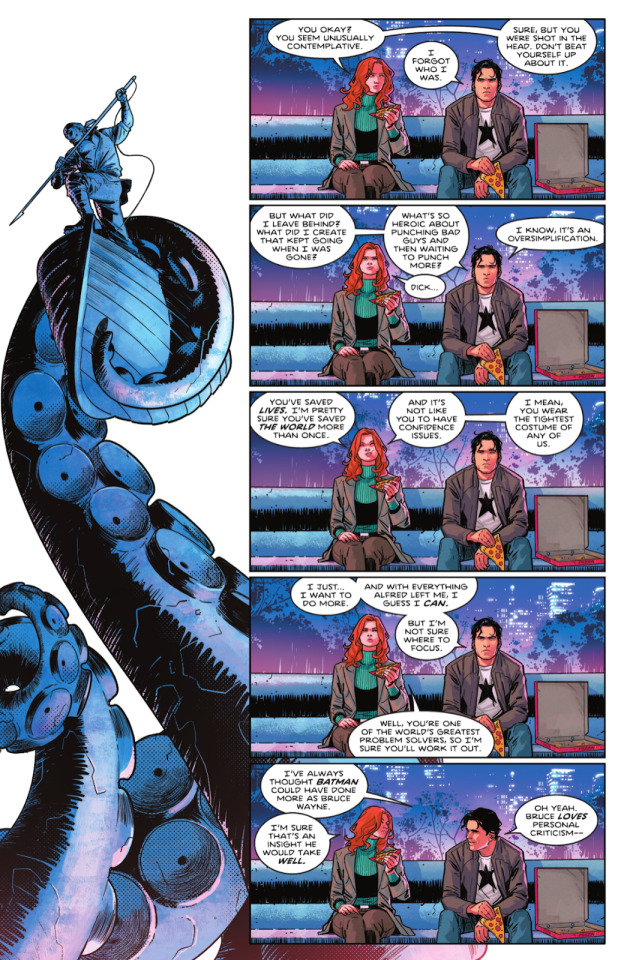
(Taylor, Tom. writer, Redondo, Bruno, illustrator Leaping into the Light Part Two. Nightwing: Rebirth. 79, e-book ed. DC Comics, 2021. pp 07)
This is a popular online discourse that reveals lack of knowledge about Batman and a naive understanding of how corrupt systems function. I understand we are currently very critical (and rightly so) of billionaires and the hoarding of wealth. I understand that this leads many — media critics and everyday fans — to analyzing how wealth is portrayed in the stories that resonate within our culture. But anyone who claims that Bruce has not used his wealth for the benefit of Gotham outside of funding his Batman endeavors has not engaged properly with Batman media. I’m not going to go into the merits of how Bruce’s wealth should or should not be portrayed and how DC has currently been handling this issue (that is the subject for an entirely different essay that is not relevant to this discussion), but I will say that Bruce has, canonically, used a lot of his money to fund safety net programs in Gotham, to invest in small businesses and on individuals, and in trying to make the city more affordable and kinder to those with less.
Twitter user Ashley|TheBatFamily 🦇 (@TheBat_Family) created a comprehensive Twitter thread of examples. These are but some of the ones that stood out to me and that feel most relevant to this essay:
In Cataclysm, Bruce attempted to lobby the US government to offer aid to Gotham after the earthquake;
Bruce used his money to rebuild the city during No Man’s Land;
Bruce invested in the people who were ready to start new businesses so Gotham could offer jobs to its people and rebuild itself without being fully dependent on others;
Bruce created scholarships so more people could attend university;
Bruce funds Leslie’s free clinic as well as other hospitals around Gotham;
Bruce invested on low-income housing developments in Gotham by working with local firms, providing accommodations to local residents so no one would be displaced;
Bruce expanded and modernized Gotham’s public transportation system;
Bruce ensured all Wayne properties were secured against earthquakes (which led to those residences being the only ones standing during NML);
Bruce funds libraries and museums;
Bruce funds green efforts not just in Gotham, but in other places by buying land and making them nature preserves;
Bruce funds orphanages and provided them resources (from educational supplies to toys for the children);
Bruce provided support for immigrants;
Bruce funds appeals for wrongful convictions;
Bruce provides employment for former convicts;
(Ashley [TheBat_Family]. Twitter, 13 October 2020, https://twitter.com/TheBat_Family/status/1316006509923520512.)
In short, Bruce Wayne has done everything and more that Dick claimed he wished to do for Bludhaven. There’s nothing novel about the idea. Batman narratives don’t put as much focus on these endeavors and do not place as much emphasis on Bruce’s philanthropy simply because they Batman stories are, at their core, detective stories first and foremost. Their focus is on investigation and crime solving (Though I would argue that Cataclysm and No Man’s Land put a lot of focus on issues of wealth, class, and examine Bruce’s financial responsibility towards the city).
But just because these examples are not the focus of the stories in which they are present, it does not mean that they do not exist. Neither does it mean that Batman stories do not engage with themes of wealth and class inequality, as well as systemic corruption. In fact, I would argue that many of the best ones know how to use Bruce’s privileged status to explore these issues. The Court of Owls by Scott Snyder, for example, brilliantly uses the Court and the Talons to engage with these themes. (An essay analyzing the Court of Owls through such a lens would be a fascinating study, especially when exploring the parallels and foils between the Court and the Talons, and Bruce and Dick. Alas, this is not the place for it.)
Dick, who not only has always been characterized as knowing Bruce better than most people, but who was also raised by Bruce, would know about every single one of the examples listed above. Dick, of all people, had a front row seat to all the ways in which Bruce helped Gotham with his wealth, both in examples that were covered by the press, and the ones Bruce did secretly without taking credit. Dick attended countless fundraising events, press briefs, boardroom meetings. But most importantly, Dick would have witnessed with his very own eyes that lack of funding is not at the root of Gotham’s problems. The problem in Gotham is not lack of money or safety nets, but rather, it is that its systems are so corrupt that pumping more funds into it will do nothing to help those in need. Instead, it will only further enrich those who are already in power. That’s why in this comic book world with comic book conventions and comic book logic, Batman is needed. Batman is a disruption to the system, forcing it to change, dismantling it from both the outside and the inside. In Dixon and Grayson’s Nightwing runs, Dick’s understanding of systematic problems can be observed in his motivation to become a police officer, as he joins the force with the goal to weed out the corruption and dismantle the system from within. Money alone cannot save a city if the foundation was purposefully designed to favor those on the top by taking from those at the bottom.
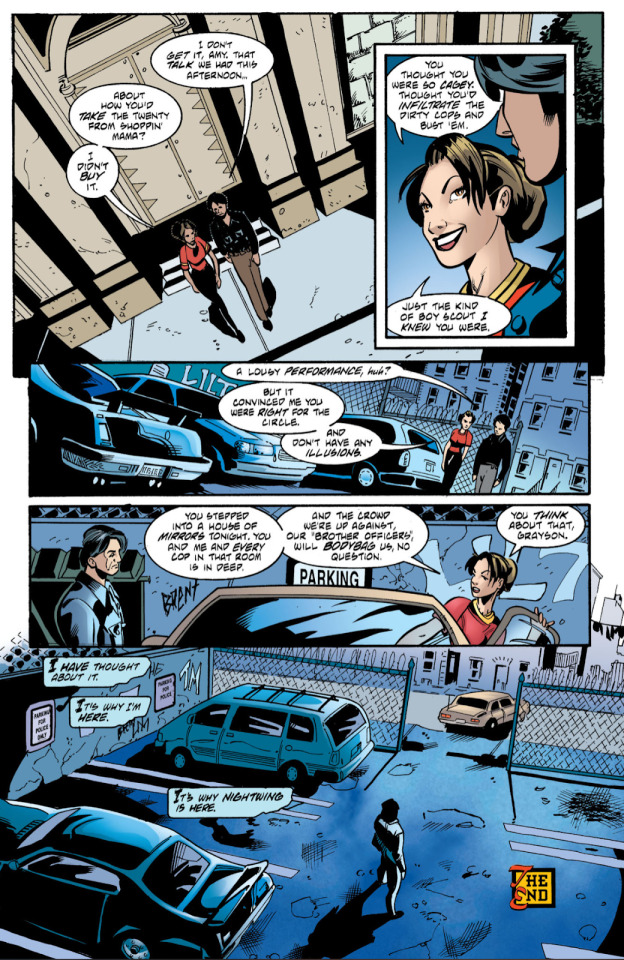
(Dixon, Chuck, writer. McCarthy, Trevor, illustrator The Threshold. Nightwing. 60, e-book ed. DC Comics, 2001. pp 22)
But of course, Taylor never takes a moment to wonder how being raised by Bruce Wayne would influence Dick’s perspective on this matter. Instead, he once more takes a popular online discourse and makes Dick say it out without considering characterization. A more in-character and canonically accurate approach to such a story moment would have Dick comment on all the ways Bruce used his money behind the scenes to help Gotham, and how he wishes to do the same for Bludhaven. A single line change would have demonstrated Taylor's willingness to engage with Dick’s character history rather than just copying the hot takes he sees on social media.
Not only that, this change in dialogue would also establish Bruce and Dick’s closeness as it would show that not only is Bruce a source of inspiration for Dick, but that Dick is one of the few people who have seen this side of Bruce. That would have also made the hug between Bruce and Dick in the #100 more emotionally effective and thematically cohesive, especially as they are in front of Alfred’s grave.
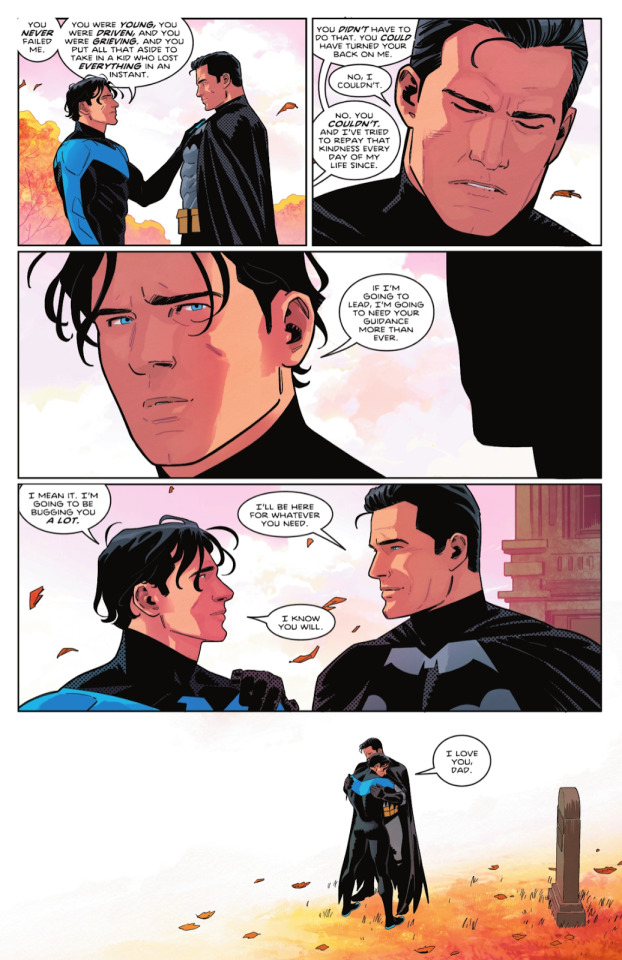
(Taylor, Tom, writer. Redondo, Bruno, illustrator Power Vacuum: Part Four: The Leap. Nightwing: Rebirth. 100, e-book ed. DC Comics, 2023. pp 44)
The truth is that Dick's Haven project engaged with issues homelessness only in the most shallow of manners. Rather than discussing the realities of this matter, it simply used it as a backdrop. It is an appropriation of hardships by someone who is unwilling to engage with the difficulties brought upon by said hardships. It is substance-less writing masquerading as social consciousness.
The third example I wish to cite which demonstrates Taylor’s lack of consideration for Dick’s character or his backstory comes when Haley is taken in #87. Dick’s internal monologue reads that “The last thing I’d want is for anyone to be threatened because they’re close to Dick Grayson,” referring to the fact that he is now a public figure thanks to the press conference he gave about his plans for Bludhaven.
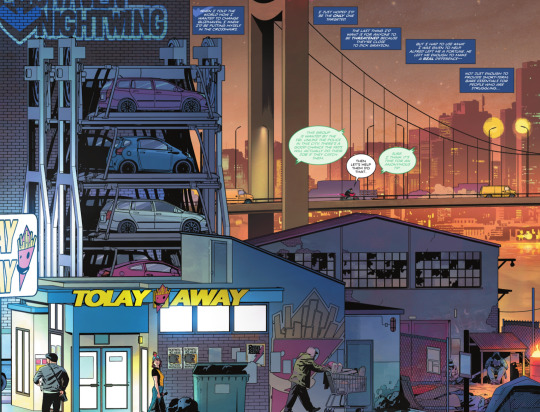
(Taylor, Tom, writer. Redondo, Bruno, illustrator Get Grayson. Nightwing: Rebirth. 87, e-book ed. DC Comics, 2021. pp 09)
The idea that Dick Grayson, billionaire Bruce Wayne’s first child, was unaware of the dangers faced by those associated with a public figure is laughable. The idea that the first Robin, who was often taken hostage by villains who wished to get to Batman (so much so that Frank Miller famously nicknamed him “Boy Hostage”), did not understand the threat posed to those who are close to powerful figures is insulting. After well over a decade as a superhero, and after well over a decade of being associated with a wealthy public figure, Dick should know better than most how such ties can put loved ones at risk.
In-universe, this line makes Dick appear so self-centered that he does not take into consideration how his actions affect his loved ones. It makes him appear dense, unable to think through his actions and strategize contingency plans and safety precautions before taking such a giant risk.
Out of universe, this betrays a lazy way of storytelling, with Taylor going for low-hanging fruits without thinking of how that might affect the characterization of his protagonist. Out of universe, a collection of throwaway, thoughtless lines like this demonstrates just how uninterested Taylor is in giving even the slightest consideration to who Dick Grayson is meant to be, instead putting his focus on the gimmick that will get him noticed on social media.
164 notes
·
View notes
Text
The canonical differences between Demon and P1 Dude: How mischaracterizations lead to sanism.
There is a lot of ableism/sanism in the Postal fandom, especially surrounding P1 Dude. I'm tired of people thinking that Demon and P1 Dude are the same entity/personality/have the same moral conduct. I understand how easy it is for misinformation to spread about old indie games. I am not here to attack anyone. I just wanna shed some light on a few things.
There is a reason that P1 Dude's journal entries sound and look completely different from Demon's. P1 Dude was completely detached from reality and believed he was killing monsters to "save humanity," not innocent people. Yes, P1 Dude was a terrified, anxious, traumatized, psychotic man. Meanwhile, Demon was a cold sadist who enjoyed killing and spouting off goofy one-liners. They have distinctive personalities.
RWS has stated many times that P1 Dude was an average guy that was really going through it before he "went postal". He was not plotting, planning, or scheming to kill a bunch of people. (He is not like Notim from Hatred.) Quite the opposite. He only purchased a Kevlar vest and armed himself at the point he felt his life was in mortal danger.
He lived in a dangerous area of Paradise in which he heard gunshots and screams after dark every night. When he began to feel genuinely threatened, he purchased a singular gun. (This is all in the lore.) The rest of his weapons are found and collected in-game. He did not begin shooting at anyone until the cops literally came barging into his front yard shooting at him first. While that doesn't justify him going on a killing spree, it is the moment that set off his paranoid delusion fully.
We know from the lore that Paradise is a fucked up place filled with dangerous people. There is something genuinely wrong with Paradise that pushed Dude to this point (even if he likely already had mental health issues). The real-world threats he was experiencing amplified the delusion that everyone was out to get him. Chronic stress and trauma can make a person become highly psychotic. You are not immune.
The wrong man in the wrong place at the wrong time makes all the terrifying difference. RWS stated he is an "everyman". He is meant to be related to without condoning what he does. The whole idea behind Postal 1 is that this could happen to anyone in the right circumstances. Absolutely anyone can develop psychosis if they experience enough stress.
In P1 Dude's journal entries, he repeatedly stated that he was scared and thought people were trying to kill him. He was straight up visually perceiving the people shooting at him as creatures infected with the "hate plague". Many of the loading screens show what people looked like through his eyes. They have heavily distorted, skeletal, and monstrous faces. On the flip side, Demon's journal entries are quite sadistic, playful, and a bit poetic. Demon speaks completely differently from Dude, aside from a few later journal entries when his sanity slips further. It seems like the delusion is worsening at that point and Demon (if real) is possibly taking over further. It is important to note that Dude never speaks in-game. That is all Demon's voice speaking. RWS confirmed this.
According to RWS, no one else can hear this voice but him. It was deliberately left ambiguous as to whether or not this is an actual demon possessing him, or merely part of his psychotic delusion. Nonetheless, P1 Dude completely lacked agency over Demon's thoughts/behavior. Thus, wholeheartedly blaming P1 Dude as if he was somehow aware of what he was doing during his psychosis is straight up nonsense.
You could say he was like a puppet for Demon/his delusions. To say there is no difference between P1 Dude and Demon is to fundamentally misunderstand how this character was written. He did not know what happened until the end of the game when he realized he was attempting to harm children. That's what made him collapse to the ground in shock and horror. Everything I have stated is 100% canon and can be sourced directly from the original Postal 1 manual, in-game lore, canon information in the game files, RWS' social media accounts where they answer fan questions, and old interviews with the original dev team.
This may be a tough pill for some to swallow, but there are people with psychosis so extreme that they are 100% lacking in awareness of their own behavior. That is a real thing that happens to people all the time. There truly is a lot of ableism, sanism, and misconceptions about how psychosis works in this fandom. Please don't contribute more stigma toward psychotic people if you can help it.
With all that being said and done:
Do I think what he did is ok? HELL NO!!! I can deeply empathize with a traumatized psychotic man who thought he was “saving humanity” by killing monsters without condoning his actions. So can you, even if it is solely cognitive empathy. Severe persecutory delusions are no joke! That's a pretty tragic situation to be on either end of. Imagine thinking you were doing something akin to killing off a zombie outbreak…only to realize you committed absolute atrocities. That's peak psychological horror, my dude. That's raw and real as hell to me.
I am not primarily concerned with P1 Dude's overall sense of morality. My focus is on pointing out the clear moral discrepancies/dilemmas that were deliberately written into the lore. These are moral discussions in the context of Dude's delusional perspective. Obviously, from the player's perspective/morals, his delusion is completely fucked and not logical. It is a delusion, after all. Explanations don't and should never equal justifications. I am not focused on if he is good or evil, as I do not believe in that type of thing. My main focus is with understanding the context of his delusional thoughts and actions. I think people are just people. They're all capable of wonderful and terrible things. I am primarily concerned with the canon lore and ableism/sanism toward psychotic/delusional people I have been seeing. People do not choose their delusions or control them, period.
-Sincerely, someone who has experienced similar delusions.
Edit: I originally wrote this post when I was sick, sleep deprived, and had a hellish headache. I have since tried to elaborate on several points I feel I did not explain in a nuanced enough way, initially.
I have noticed some people quote the Postal Strategy Guide claiming that P1 Dude shot first. That is a fair concern to bring up. This is slight misinformation on the original writer's part. Even if you do absolutely nothing in the game but stand around, the cops shoot first. Paul did not work at RWS, was not a game dev, and did not write the lore. Vince Desi confirmed P1 Dude was, indeed, attacked initially. Misconceptions and errors are very common in game strategy guide books from the 90s and early to mid 2000's.
#postal#postal 1#postal 1997#mental heath awareness#horror#psychosis#delusions#hallucinations#trauma#mental illness#canon lore#myth busting#ableism#psychological horror#paranoia#paranoid delusions#persecutory delusions#postal 1 dude#social stigma#actually psychotic#sanism#psychotic#mental health#postal dude#human psychology#video games#video games and mental health#video games and mental illness#artistic depiction of mental illness#artistic depiction of persecutory delusion
58 notes
·
View notes
Note
Sorry if this has already been discussed but its so interesting to me how lucas is seen and portrayed through the lense of the fandom. It feels like in a lot of fandom works he either has to be the antagonist or the "perfect" one and he isn't allowed to be complex, fleshed out or built upon like other characters. In some works he's either the one who's homophobic, says something wrong/hurtful or he's antagonized for his plotline and wanting to conform (for good reason) in s4. In others he's max's "perfect boyfriend", a supporting character for mike who's just there to give advice, or just a character who's there to comfort and build up others in general. These choices definitely reflect the duffers writing of lucas but it's interesting that in so many fanworks that can build upon what's given in canon and expand on existing characters he's left so flat and is either the person who does something wrong or the person that can do no wrong ever and in both cases it's usually used to uplift a different character in some way.
Despite the sub-fandom's loud proclamations of all encompassing love for Stranger Things, analyses and fanfiction highlight this love's true limit. The limit being characterization outside of facilitating or validating the desired plot point. These characters frequently end up being depicted as shallow tools for individual fantasies.
Bylr, mainly Mike, is the center of many of these fantasies. You see this in how people write Max as Mike's therapist, treating her as an expository device for Mike's trauma. You see this in how people write Will as Mike's doormat, demurely soiled by Mike's foul behavior and happy to serve again. And, you see this in how people write Lucas as the malleable everyman.
On the one hand, this behavior is a reflection of the Duffers writing. Lucas is usually kept in the periphery, supporting but not centered. The writers focus on Lucas as an individual more during his S4 conformity plot line. The issue is that his character development is due to external force rather than introspection. Instead of fleshing out Lucas' understanding of the world, the writers reiterate what we already know about Lucas. Outside of basketball, there's no new information presented about his life, his interests, his family, or himself.
What we do get is a one liner with the subtlety of a sledgehammer, a reaffirmation of his love for Max, and a violently temporary resolution to the multi-functional Jason v. Hellfire conflict. Rather than address race, the Duffers prioritize geekdom. While it maintains the show's "sensibilities," the Duffers' cowardice proves their unwillingness to challenge the status quo, whether that be creating uncomfortable situations amongst the ensemble or compelling the audience to question their own assumptions about Lucas. Of which, they have many.
On the other hand, it's not like Lucas himself is uninteresting. He's a meta-textual underdog, once reviled by the audience for being skeptical of the suspicious little white girl. Lucas was known as the "aggressive" one, despite his character's S1 motivations being laid out clearly, not breaking limbs or making eyes bleed, or getting into more than one physical fight. When people reappraised the show after S4, Lucas (especially Caleb) garnered greater appreciation. How much of that being genuine is another topic, relating to performance in fandom and online spaces.
Outside of his valuable contributions to the group, Lucas has numerous qualities that make him an excellent brother, friend, and boyfriend. He's got a keen mind, always prepared with a retort (but less so than Erica). He's skeptical, balancing out the idealists, theorists, and dreamers in his friend group. He's pragmatic, providing common sense solutions for average to larger than life problems. He's bold, willing to pursue independent action despite the danger. He's got grit, an unwavering determination in himself and his judgment. He's stubborn to the core, making him a fierce protector. He's self aware, graciously accepting his mistakes and take immediate action to do better.
It's not just those personality traits that make him endearing but his perfectly imperfect contradictions. He's one verbal blunder away from a permanent break-up with Max, however he charms his way into her good graces time and time again. He's the Hawkins High's MVP, shooting a championship winning basket during his freshman year. Meanwhile, just a year ago, he used to get a thrill through karate kicking his way through Hawkins Middle classroom doors (then getting caught). No matter how "cool" he gets, Lucas Charles Sinclair is, and will always be, a dork.
It's difficult for people to parse out these aspects of Lucas, when their primary understanding of a character is derived from said character's relationships. It's one reason why shippers struggle with grasping a character's identity and motivations. They can't see the forest for the trees.
The sub-fandom's fixation on romance is a given but, per their self-appointed high level of "media literacy," it's worth noting for hypocrisy alone. "Media literacy" apparently only applies to a single, white queer, lens of interpretation. When you have a character like Lucas, who doesn't adhere to this limited scope of skill and interest, people will either disregard him or make him conform to the their expectations.
Look at how bloggers analyzed Lucas on the Line, when they weren't making it about Mike. People had a fundamental issues understanding Lucas' relationship with his Black peer mentor, Jermaine. What they thought was sexual attraction was actually admiration. He's in awe of Jermaine, who is a cool and confident Black upperclassman in a predominantly white community. That is why he becomes Lucas' role model, giving Lucas something to aspire towards.
This isn't me saying these bloggers are racist. This is me pointing out that race wasn't even a factor on their identity issue radar. To be frank, it isn't on the Duffers' radar either.
Ultimately, fandoms are places of habit. If people can't utilize Lucas as a means to resolve Mike's issues, such as his fandom-minted trauma or romantic angst, then Lucas is relegated as set dressing. The type of set dressing includes but isn't exclusive to: a plug-and-play dynamic with Max, the queer ally relationship counselor/therapist, or the scapegoat for an intra-party conflict.
While the first two are dull but harmless, the latter leads to some insidious scenarios, such as Lucas being cast as the homophobic party member. Lucas being homophobic is founded on assumption, not text! If you need to look for a homophobe-in-training, please look at repressed Mike Wheeler.
Lucas can't even catch a break when he's not being depicted as a homophobe. In an effort to minimize the collateral of Mike and El's break-up, as well as appease El stans, shippers paired up Max and El. Ironically, Lucas becomes a form of collateral himself. The only difference is that, unlike a single El, shippers can live with the fallout of him third wheeling his throuple or rationalizing Max's "amicable" break up with Lucas after the events of S4 and S5.
As I said in another post, it's never about Lucas. It's about what he can do for you.
#hello it's me#this is very old. so sorry. i randomly felt motivated to tackle this a tad.#lucas sinclair
39 notes
·
View notes
Note
asenora i will listen to anything you have to say about these characters ever. please tell us what the tea is with dron
as i rummage through the backlog of messages in my inbox the thing that i have discovered is that you girlies [gender neutral] are absolutely clamouring for citizenship of dron nation.

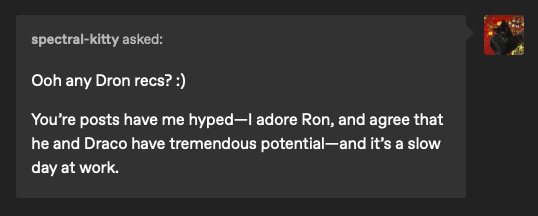

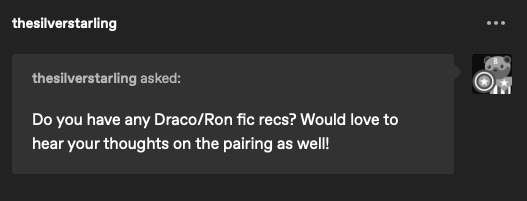
[thank you to @spectral-kitty, @thesilverstarling, and two mystery anons!]
to which i say, the borders are open, baby. you just have to read the following manifesto:
why fandom needs to stop sleeping on dron
something i am continually banging on about, as regular readers know, is the harry potter series' fondness for assigning [male] characters to narrative mirror pairings.
exploring these pairings is interesting in and of itself without a romantic dimension being involved - i could talk for hours about the mirrored approach to guilt and grief in snape and sirius' characterisation - but it's also true that several of the most interesting ships which can be drawn [however non-canonically] from the text are between the two halves of each mirror pairing.
tomarrymort is the obvious one, snack [or starprince or snirius or whatever we're calling it] is starting to get the attention it deserves, but people are still sleeping on draco malfoy/ron weasley [and also, may i say, on lucius malfoy/arthur weasley and narcissa malfoy/molly weasley], largely - i fear - due to the sheer popularity of drarry and dramione.
i'll be honest that i really don't like dramione, and i'm generally ambivalent towards drarry, but i do love dron. and the narrative mirror aspect is entirely the reason why.
ron and draco begin the series as mirror archetypes within the genre conventions of a children's boarding school romp. ron is the loyal, humble sidekick of the everyman protagonist, draco is the everyman protagonist's posh, stuck-up rival. both are insiders to the world of the story - whereas harry, the reader surrogate, is not - who introduce harry to the positive and negative aspects of the wizarding world respectively.
as a result, ron and draco are mirrors in terms of personality, and are much more similar to each other than either is to harry or hermione. this doesn't, of course, preclude ronarry [a ship i adore] or romione [which i've defended here] or drarry or dramione [if ya nasty], but it introduces a specific - and very interesting - tension into the pairing which is absent from these other ships.
both ron and draco have shared positive traits - they're both loyal [and their loyalty is very practical and pragmatic - ron is not hagrid, whose faith in e.g. dumbledore is totally unwavering; draco is not bellatrix, whose faith in voldemort is the same], they're both highly observant, they're both quick-witted, they're both capable of doing the right thing - if not always immediately [which is, in fact, more admirable than being preternaturally willing to suffer and sacrifice], and so on.
they also have shared negative traits. they're both attention-seeking [ron fucking loves nearly being knifed by sirius and you just know draco was seething], self-aggrandising, insecure, sulky, and predisposed to jealousy.
and this is a gift for authors, because it means that dron butt heads in a relationship in ways which allow for real character growth... or otherwise.
one issue that i have with drarry is that it often feels like the change either one goes through within a fic is kind of out of character. for example, you have a harry who feels insecure and haunted by his ill-treatment of draco [this is a man whose response to committing attempted murder is to be raging that it reduces the time he has free to hit on ginny], or a harry who is chasing after a cool and sophisticated draco who eventually learns to open up [whereas if there's two things draco isn't, it's someone who keeps his thoughts to himself and someone who isn't a distinctly unsophisticated flop].
dron, however, react to conflict in the same way - which means that the two of them finding themselves in conflict with each other absolutely slaps. they also have similar levels of emotional intelligence, and are likely - if they're inclined to - to be able to communicate with each other and work through issues surprisingly effectively. they can be a mess, or they can be a happy-ever-after, and i like that in a ship.
but, while ron and draco are mirror archetypes, they are specifically children's literature mirror archetypes. ron's role as harry's guide to the world diminishes in the later books, as the series' horizons move beyond hogwarts to think about wizarding society and voldemort's impact upon it more widely [he is replaced by characters such as dumbledore]; while harry becomes considerably less bothered by the pettiness of draco's rivalry with him [concerned as it is with things like being good at quidditch and getting away with misbehaviour at school] as the enemies he's focused on shift to being the resurrected voldemort and his death eaters.
which is to say that dron makes considerably more sense within a hogwarts setting than drarry.
as i've said elsewhere, an issue i have with drarry is that it's frequently written in a way which suggests that harry and draco have a mutual obsession with each other - while the actual evidence of canon is that, while draco is [as his archetype demands] preoccupied with what harry's doing, harry rarely gives the impression of caring what his rival is up to unless directly compelled to by draco's own attention-seeking.
ron, in contrast, spends a lot of time noticing things about draco unprompted - he can, for instance, recall overhearing him boasting offhand about what broom he owns in philosopher's stone - and retaining this information in order to deploy it at the opportune time to get a rise out of him. he delights constantly in his misfortune [him being hyped for days because draco's annoyed harry gets a firebolt is beautiful]. he's ready to throw hands with him at any given opportunity, often giving those of us who thrive on cheap innuendo plenty of material in the process [draco finds himself, for example 'on all fours, banging the ground with his fist' after having ron's wand pointed in his face... same, girl.] and he tends to consider draco much more integral to the various shenanigans which take place in the castle than harry does [ron is the main proponent of the 'draco malfoy is the heir of slytherin' theory in chamber of secrets - and he is shook when draco reveals that he's wrong].
and draco does the same. he comes into the trio's compartment on the train in goblet of fire and immediately starts telling ron how unfashionable his dress robes are. he obsesses over ron's position as gryffindor keeper for months - and, of course, makes up a song about it, which isn't exactly helping him pull off 'i don't think about you at all', is it? - and ron is profoundly affected by the taunts in way that harry, who doesn't really care what draco thinks of him, isn't. and he constantly goes out of his way to provoke ron into trying to punch him [him shoulder-barging ron in half-blood prince just after harry's essentially outed him as a death eater in madam malkins... exquisite pettiness].
all of which is to say, their interactions feel very teenage and petty and silly all the way through to the end of half-blood prince in a way that draco's interactions with harry and hermione don't, and - therefore - i sincerely think that dron can be made to work much more plausibly as a pairing in fics set while the characters are at school.
my final point in favour of dron is that they mirror each other in their approach to their other relationships, and the tension this causes is really interesting to explore.
both ron and draco have mirrored attitudes towards their place within their own families - something neither harry nor hermione can have with draco for obvious reasons. ron is one of many siblings and feels overlooked in the crowd; draco is an only child and feels overburdened by the visibility, especially once his father is sent to azkaban. they both conform to behaviours expected of them by family [they are both in the same hogwarts house as generations of their family, they share their families' political views etc.]. they are of the same social class and their families both have a reasonably similar level of political influence [despite what we're told about his insignificance, arthur weasley is known to everyone in the ministry and he's able to throw his weight around to influence policy even before the promotion he receives in half-blood prince], but their material circumstances are divergent. they both heavily resemble their fathers - to the extent that they are immediately recognisable as each man's son - and spend their schooldays defending family honour by playing out lucius and arthur's own petty feud [lucius and arthur - and, indeed, narcissa and molly - are also narrative mirrors, and we deserve many more enemies-to-lovers fics featuring them]. and the course their lives take during the war is dictated as much by their role within their families as it is by their relationship with harry - the scrambling post-dumbledore order operating out of the burrow is a mirror image of the ascendant voldemort operating out of malfoy manor.
they are also obviously defined by their mirrored relationship with harry - most interestingly by a major similarity in their attitude towards him: that both struggle with how jealous they are of harry.
this leads to lots of excellent tension which just isn't possible in drarry or dramione. how do both sets of parents react to the news their sons are in love? how do ron and draco's relationships with harry change as they find each other? how does draco cope with the hustle and bustle of life at the burrow? how does ron deal with having to have dinner at the manor [particularly interesting because the world in which draco lives is one that's familiar to him - he's not going to be shocked by any of the weird stuff in that house, he knows how it all works, so he can ruin christmas by deciding to have his dad arrest lucius for fun instead]?
it's messy, and fun, and it sustains me.
and some recs for the lads?
collateral damage by @danpuff-ao3, which starts out with both of the lads working out their... issues with harry and ends with declarations of going to lunch with each other's mothers.
dance the night away (aka it's true love, you bastards) by evandar, which has as its premise ron and draco ending up, largely by accident, going to the yule ball together.
this great stage of fools by @nanneramma, which correctly demonstrates how ron is charming enough that him being supremely annoying is actually loveable.
134 notes
·
View notes
Note
Hey!! your writing is AMAZINGGGG and I love how you view characters.
Do you have any headcanons for vinnie everyman?
MOON!!! HI HI you are literally the reason why i made this account and started taking writing seriously,,, sobbing rn
i was planning on making a post about Vinnie but i couldn't come up with any interesting ones, so here are some that i brainstormed. sorry if there are any mistakes, i wanted to make them close to canon but i put some of my theories in there too :)
Vinnie Everyman Headcannons
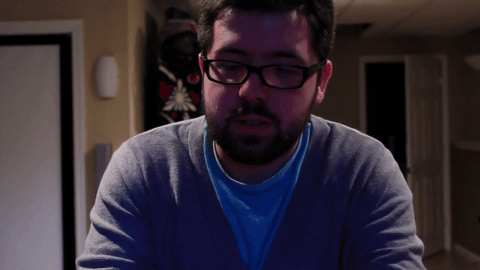
-(this one's kinda sad so apologies) He sees Evan through HABIT, and HABIT through Evan. Basically: when HABIT jokes with Vinnie, he sees Evan. He sees his jokey and rowdy friend at that moment. But he has to remind himself; that's not Evan, that's a monster. But. When HABIT left Evan's body for some time, Vinnie could only see HABIT. He tells Evan that he doesn't think he's a monster, but i believe in the back of his mind, there's some bitterness. He knows this isn't Evan's fault, but he's still frustrated. He's so confused, no one's giving him answers. Except for HABIT.
That's why i think he's disappointed in a way, he wants HABIT to stay in Evan's body. HABIT is useful, although destructive. He doesn't like HABIT, he doesn't want to like HABIT, but he still needs him. He needs someone to tell him what to do, a higher being that knows more than him.
-^ continuing that, that's the reason why he didn't take Corenthal's warning seriously. He believed HABIT over his own father, biological or not, figure because HABIT is so knowledgeable. He thinks HABIT is so wise, and that's what HABIT wants Vinnie to believe. It feeds his ego, and he keeps Vinnie under his control.
-Also, it's not really hard to be manipulated by HABIT. He talks and acts like he's wise and knowledgeable, and honestly, he's good at it. Vinnie's intimidated by his threats, but also follows him around like a dog. Again, i'm repeating myself, but he's so infatuated with HABIT cause he feels like he's the only one that can answer him. And HABIT keeps him around to feed his ego, and to get his plan going.
-Furthermore, I think his relationship with Corenthal is SO interesting. Although i think Corenthal in general is such an interesting and underrated character, but that's a whole another post. Now, for this one I'll go a bit far from canon, but these are HCs so i guess that's the point lol: Basically, i think Vinnie DOES see Corenthal as a father figure, but he has complicated emotions. He distances himself from Corenthal, possibly out of just bitterness. Now i'm talking about the YouTube iteration, not Fairmount or Princeton, so that means that Vinnie has his own biological parents. However, Vinnie's memory got wiped (i mean, he knows he has parents and siblings, but he can't remember anything about them) so who's the only one he can remember? Dr. Corenthal.
Corenthal falls under someone I believe Vinnie gets attached to; someone who's wise, knowledgeable. He's a doctor, and a much older man, and he knows a lot about the boys' situation. We don't see a lot of interactions between them, so I'll just use my imagination for this part, but i believe that Vinnie is bitter because of how little Corenthal has said. He knows the Doctor knows what's going on, yet he's such a mysterious figure. He only appears a handful of times, and the other information they have about him are from old letters he had written. So Vinnie must be thinking, why isn't he helping? Why isn't he protecting us, if he has so much knowledge? So when Corenthal does contact him, he's suspicious. He doesn't believe him, instead, he believes HABIT. HABIT's there for him, even in a twisted way, and Vinnie believes that there's no way he's being lied to. So when Corenth tries to open Vinnie's eyes, he keeps them shut, and stays blind to HABIT's manipulation. Thus, resulting to Vinnie's death. Thus, resulting to another iteration where Corenthal can't save his children.
alright that's all :3 thank you for reading and thank you Moon for the request!!
#slenderverse#request#slenderverse headcanons#vinnie everyman#headcanons#vinny emh#vinnie emh#vinny everyman#analysis#hcs#habit emh#everymanhybrid#emh#habit everymanhybrid#spotify
73 notes
·
View notes
Text
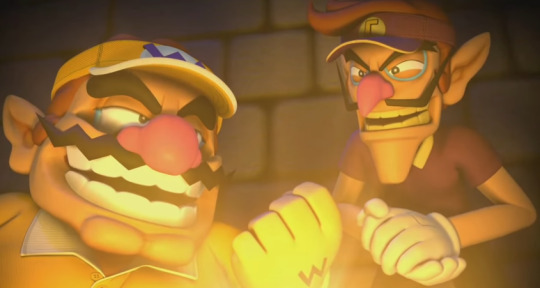
Playing Princess Peach: Showtime got me the Mario brainvurms again so I wanna ramble a bit: As much as I adore and put a lot of stock into Wario and Waluigi's dynamic (and as much as Waluigi's my favorite character), I actually don't think Waluigi should be in the Wario games. Particularly Ware, but that also goes for Land in case that ever comes back from the grave. And it's not because of anything wrong or lacking with Waluigi as a character, quite the opposite: I think a lot of what defines him, what makes him interesting in different ways than Wario, actually makes him a terrible fit for Wario's narrative real state. Not an issue when they're together filling in a necessary dynamic in Mario territory, but it gets trickier when Wario's supposed to be the lead in an actual story.
In regards to Land, the central appeal of Wario Land is in the fact that you can play as Wario. I'd said as much before that, generally speaking, where as Mario is altered to fit his games, Wario's games are built to fit him. As much as WL did to flesh out Wario as a character, the core concept for Wario Land 1, and every subsequent game, comes back to the idea that you are playing a bigger, nastier Mario, who can't run as fast or jump as high, but is stronger and full of stranger surprises, so he engages with different kinds of obstacle courses and yyou have to figure out what he can and can't do to solve them. Every alteration made to the Wario Land series over the years, not just in relation to the Super Mario Land platformers it spun out of, was built around turning Wario's existing traits into gameplay mechanics.
He is a bully and a brute and thus you shoulder bash your way through problems, his propensity for comedic slapstick turned into full blown immortality and the source of his power-ups, he is far more interested in sniffing for gold than actually saving anyone so his adventures are less linear, your endgoal is to get the biggest treasures possible, his thieving bastard explorer nature eventually allowed for a timed Indiana Jones boulder escape at every level, Shake It lets you literally shake down enemies for cash, etc. The one time they took the opposite route and really altered Wario to fit a pre-ordained gimmick was in Master of Disguise, and soundtrack aside there's some good reasons why that one's so unpopular it's not even considered a Wario Land game.
All of these are traits that are built to fit Wario, and mainly Wario, and you could argue that these by extension apply to Waluigi because of his traits that overlap with Wario's, and for sure the spin-offs demonstrate that Waluigi does tag along on Wario's treasure hunts sometimes, but if we concede this and add Waluigi as a Player 2, then: A: What is so great and unique about Wario, if other characters can also do all the absurd things he does? And B: What is so great and weird about Waluigi, if all he's doing is just the stuff Wario already does?
The Mario platformers don't really have this issue with Luigi not just because Luigi as the Player 2 is grandfathered in, but because mechanically speaking Luigi isn't very different from Mario, and because the gameplay mechanics for Mario platformers are nowhere near as specialized as Wario's is. Everybody runs and jumps and collects power-ups and does the same things Mario does, that's why the Toads and the princesses can jump in on it just fine. Wario sharing the glory of being Wario is just not what Wario does, and it's Waluigi's thing even less. With everyman all-ages Mario, everyone's invited to join in the fun, but when the whole point is you reveling in "you get to play as Wario!", WHERE BEING BAD IS GOOD AND GREED IS GOOD HEHEHEHEHEH, you really lose a lot of the appeal turning it into "you get to play as Wario, and another guy (or even more) who can also do the things Wario does, turns out Wario's willing to share I guess". Even working in a different set of paths and solutions per level so Wario and Waluigi could solve problems differently would just be splitting levels by half of the work and half of the fun.
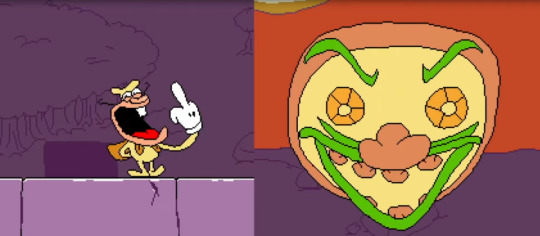
For comparison's sake, Pizza Tower has a second playable character in the form of The Noise, a rival who is opposite to Peppino personality-wise. Despite having more or less the same proportions (and in prior builds playing identically to Peppino), in order to accomodate his personality that is also his main selling point, he plays in a different manner through levels that weren't designed around him (not different enough that it excludes co-op though), and so he actually breaks the game, and that is in fact worked into everything he does: Pretty much the main running gag through The Noise Update is that he is brazenly cheating and easily clearing through the things Peppino worked so hard to beat "fairly", and that he is a piece of shit with no emotional stakes in what he's doing, turning every hardship or battle into a joke.
Pizza Tower is just as much built around Peppino's character as Wario Land is (which is part of why the game became faster and more stressful, and thus played increasingly less and less like Wario Land over every subsequent build up until release), and it was only ever going to accomodate the Noise's personality by either designing new levels (and thus a new game) around him, or going all the way on him breaking the existing ones and occupying an opposite role to Peppino's, which fits him. Again, you could argue this dirty cheater angle fits Waluigi. The problem is, again, redundancy, and it not fitting Wario Land. Gameplay-wise, Wario is already breaking and even cheating through levels to clear them, he is already flipping the middle finger to traditional Mario-style platforming the way The Noise is doing to Peppino's playstyle. And story-wise, Wario doesn't let himself be outdone, he is not getting upstaged from his own adventures. Peppino doesn't WANT to be in his own adventures, that's why the game plays him for pathos and The Noise gets played for pure satire. They get to do completely different things in a way I'm not sure you could do with Wario and Waluigi without significantly overhauling the way Wario Land works, and at that point, why bother.
That being said, I definitely do want there to be a way Wario and Waluigi could star in a platformer together, it would be a dream for me. But I don't think that's going to work for Wario Land, and not doing Wario Land runs the risk of doing Master of Disguise again so, it'd take a lot of work. I want to say there is at least a possibility of making it work, which is definitely not an argument I'd make for Waluigi joining the WarioWare cast.

The thing about how WarioWare's cast works, and how it manages to keep Wario recognizably Wario even in a drastically different role than the one he occupies in Mario spin-offs and Wario Land alike, is a very simple but effective dynamic: Wario is the boss, and everyone else is your friend/co-worker. Wario is the ringmaster, and the circus freaks need your help to keep the show afloat. Wario is Michael Scott/J Jonah Jameson, and you're in the Dunder Mifflin/Daily Bugle trenches with everyone else.
All of the WarioWare characters are lovable weirdos, it comes with the question of "what kind of person would not just be friends with, but willingly work for Wario?". They are weird, they are dorks, they are (mostly) nice, they (mostly) get along, but above all, they are accomodating. Of their weirdness, of your weirdness, even of their boss' weirdness. Their goal is to guide you through the challenges and fun and encourage you to succeed. They do all the hard work in making these games fun to play. They are directly, proportionately opposite to how much of an dynamic jerk Wario is, and that's why Wario gets to keep on doing Wario things.
He gets to cause problems and lead the gang into trouble, he gets be mean, he gets to hijack proceedings and directly insult and mess with the player, he gets to be the villain, he gets to be the butt of the joke, he gets to crash and fail. The Ware crew gets to be people you come to know and relate to and love, while he gets to be the GOTTA WIIIIN guy. It's a fine balance and a very good deal on their end.

It also has no room whatsoever for Waluigi, anti-social party crasher conniving drama queen extraordinaire, in anything other than a cameo or a one-off antagonistic competition with them. He isn't going to take Wario, or anyone's place, and his dynamic with Wario in the spin-offs just doesn't translate to Wario's role in WarioWare. And he belongs even less in the WarioWare crew (especially with characters like Jimmy T and Crygor, who have significant overlapping traits with Waluigi already), he is just not made for playing nice with others like that. It's not that he can't, his player interactions can be remarkably non-antagonistic and chill even, but it's not his thing.
He is Waluigi, as they reiterate in every bio, he is dastardly and mean and also a tryhard loser who "thinks" he's Luigi's rival more so than he actually is, and who doesn't seem to get along with anyone other than Wario, in fact he barely plays nice with Wario a lot of the time, they're partners in crime first and foremost and are depicting bickering over spoils when they work together. He'd just break the balance that makes this cast dynamic work so well without offering anything in return, and would be worse off for it. If anything Waluigi should be the last person to work for WarioWare, it has nothing to do with what he's about and the dude knows firsthand how little Wario intends to pay anyone ever. You could get stuff out of playing him as a rival trying to muscle in their gigs, or beat Jimmy T on the dance floor, and even that's stretching a bit.
I think the biggest problem comes down to the fact that the main thing with Waluigi, much like Wario, IS his outsized personality and the role it offers him, and with how Wario's games are precision-built around him and him alone as the center, putting Waluigi in those is dooming him to get sucked into Wario's orbit in roles that just don't work for him and dillute the chief appeal of putting Waluigi in stuff. Even if he's already secondary to Wario in the spin-offs, in there they fill in a niche together, two halves of one idiot, Camelot's favorite boys and all that, that you can't carry over when Wario has bigger things to do than just play along and be a nuisance to Mario.
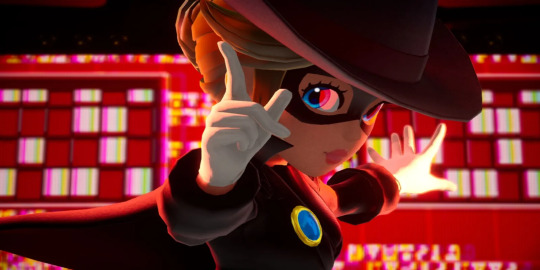
I was very happy with Princess Peach: Showtime in part because of how committed it was to the idea of putting Peach and Peach alone in the spotlight, with NO Mario elements whatsoever tagging along for the ride. There is not a single trace of Mario or Bowser anywhere, the Toads leave at the opening cutscene and don't come back until the post-credits when their only role is to give her crown back. The game is just Peach going on adventures, righting wrongs and trying new personas and putting on a show with the people she's saving.
It's short, sweet, it's kind of a baby game and it has to be for the target audience, and it doesn't seem to be super popular in general but I'm glad it sold well, I'd like for Nintendo to make more games like it. It got me to like Peach more than I ever have before, and it got me feeling very good about the fact that this exists at all. Seems like there really has been a creative renaissance for Mario over the past years. Not that I ever expect it to happen anymore, but I always dreamed of Waluigi getting to have something like this, although I'll say that Peach's was a very long time coming (especially given the failure of Super Princess Peach) and I'm glad this premise was made with her. I never thought it'd happen and that makes the former dream seem, y'know, a little less impossible. Maybe.
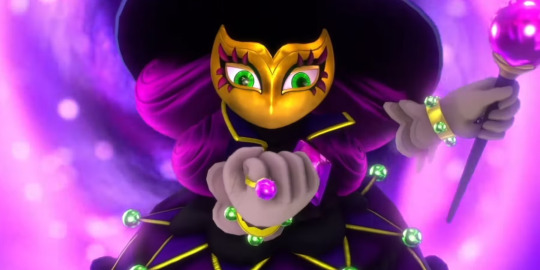
Semi-unrelated but I am also extremely glad that Madame Grape exists, definitely a character I'd like to see return to occupy a position akin to King Boo or just go-karting with the others. And by no means was this intentional, but I definitely get a kick out of the fact that the villain in Showtime is an overlooked purple-clad drama queen who creates and leads a group literally called "Sour Grapes", who wants to claim her role in a world of happy shining people who don't APPRECIATE her work unless she makes them, who wants to plaster her face and name and colors everywhere, and who is incredibly invested in making Peach her nemesis and foil, even though this story was supposed to be about Peach taking a break for a change and Grape is very far from being the worst thing Peach has to deal with on a regular basis. Just reminded me of another guy who tried to hypnotize "the rhythmless masses" with sweet dance moves once.
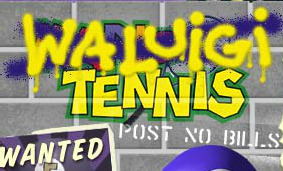
#rambles#mario#super mario#waluigi#wario#wario land#warioware#pizza tower#princess peach#princess peach showtime#madame grape#nintendo#videogames
58 notes
·
View notes
Text


beasts | from the postbag 🦉
it is a source of great delight, great gratitude and great guilt that i have an inbox full of juicy questions i haven't answered. reckon it's about time i got around to answering some of them! this is a bumper post with lots to answer and plenty to rummage around in, so if you have sent me a question i hope you will find it answered in here! (if i haven't replied, please know that i have treasured/been tickled by every one and will never not be pleased as punch that people reach out to say hi and chat about stuff i put out into the world). alright. to business!

it’s a fair question anon, and the answer is at least partly as you suggest: neville and seamus are loyal to ginny (dean, ofc, wasn’t there). in c.12 harry talks about having spoken with neville about it, and though he tells ginny about it, he also reassures her neville didn’t spill her secrets - harry doesn’t like people talking about him behind his back, and he’s right to assume ginny wouldn’t either. (i mean, i also think waiting for someone to be ready to talk about something is a basic mark of respect for a loved one - and learning to be patient and not demanding information from people is a skill a certain mr potter could do with learning). but, as i hope c.14 gestured towards and as the flashback chapters will unpack, ginny also had a very specific war that was particular to her and who she was vis-à-vis harry and the order. neville and (to a lesser extent) seamus know some of it, but they don’t know the whole picture. hope this helps!

i live to gag! (thank u anon!)
i played with writing ginny having different emotional reactions in the final scene of c.14, but in the end decided i liked having her quiet, resigned to it, like she knew this was coming (they’ll all know soon, as she tells herself throughout this chapter). for someone who is often kicking off and raging at people bearing bad news, it’s a lot of fun to write ginny as someone with the wind knocked out from her every now and then.

i won’t spoil this one, anon, but i will say that i think ginny understands harry, his good intentions, and the reasons for his blindspots. they’ve got chats to have for sure. but will she be throwing hands imminently? i would not bet on it.

it was little women! the same book hermione's reading in chapter 3. the granger girlies love a classic. they prefer the winona ryder adaptation but hermione takes the family to see the greta gerwig version and bawls and ron has to mop her up in the richmond everyman cinema.


to these lovely anons and the others i am keeping close to my chest - i am reaching into the screen and tenderly stroking your rosy little cheek. thank you for waiting for next bits of my fic !!!
on harry's characterisation - harry is a cranky crabby little grouch with a temper and a good sulk in him. he also is not beating the softie/sentimental allegations and will always be a sweetpea when it comes to those with good vibes and freckles in spades. and we should not forget it!

anon, i don’t know what you’re like as a host, but if two horny teenage houseguests decided to use my hut for a spot of snogging and heavy petting i’d be putting my foot down and setting the skrewts on them.
more seriously - there are lots of reasons, and most are boring. some are just ‘plot’. these are two characters who are not just physically removed from one another, but having to clock their emotional distance from each other, or at least the distance in their experiences of war and how that has changed them. having them physically distant and trying to find their way back to each other through new ways of communicating is a part of this story. it would be a much much more boring story if harry and ginny could see each other every week. i love a hinny hangout as much as the next person. but the story wouldn’t work if they had endless access to each other. and this is where the other reasons come into play - story conventions, or the rules put in place by canon, where characters beyond hogwarts very rarely set foot on hogwarts’ grounds without serious reason, and the school behaves pretty much like every other english boarding school, which is strictly controlling visitor time and not just letting people rock up and hang out with the students whenever they feel like it.

you best believe michael A&R corner will be handing out the ravenclaw lads’ mixtapes outside the courtroom, anon!

this is definitely an agree-to-disagree on this one, anon. i think, if there were no post-war justice, no trials, no public reckoning, no need to immediate need to clear snape’s name, then maybe. but i think harry would get one whiff of death eaters trying to blame their crimes on old sev and say, not on my watch. he’s literally the only person who can clear snape’s name posthumously. do i think he felt weird about it all? absolutely. but i think he would do as he does in ootp re clearing his own name and make it his business to get the truth out. i don't know if you've noticed but that young man is really rather righteous. he also couldn't wait to tell voldemort snape was actually a goodie. he was chomping at the bit, he was salivating. he had the goss and he could not wait to spread it. he's just like me fr!

thank you sm anon! i have talked a little bit about my view of hermione and ginny's relationship here (forgive the link to an old thing, i am terrible for repeating myself), but i think their relationship as you see it in beasts is my way of trying to write the middle ground between the two views of their friendship often doing the rounds in fandom - eg. they're absolute soulmate besties who totally get each other all the time vs they're basically not friends at all. i am just a bit of a sucker for hard won female friendships earned by girls growing up and getting a grip. now - if harry and ginny had an argument, i imagine ginny would be right, and hermione is always on the sign of reason. but even if ginny wasn't right, i reckon hermione would have a quiet word with her about it, but still make sure she told harry off to, just because it's good to never let the men in your life know peace.

i yelped! you dreamed of my fic! that's bonkers and brilliant in equal measure. look if chapter 15 gets revealed to you in a dream and it's better than in the google doc i'll be soooo fuckin pissed.


#beasts#spoiler alert it's just 900 messages that say 'when the fuck will your protagonist name the sodding pet you gave her eleven chapters ago'#which is fair#asked and answered#authors note
38 notes
·
View notes
Text
Janeway:
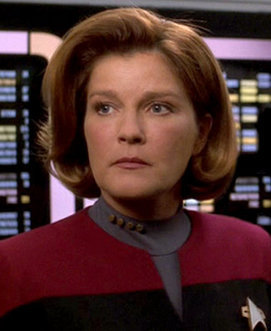
- will literally martyr herself at the drop of a hat
- will kill you if she thinks it's what she needs to do for her crew
- will not kill you if she thinks you've got residue humanity after decades as a borg drone even though realistically she really should've (tho ofc we're all glad she didn't)
- will violate your personal rights if she thinks you're not "human" enough and also compare you to a replicator (yes I'm still salty about that. wait what was the question? right, i'll get back on track)
- will say absolutely deranged shit like "then be a good rat and find us the cheese" in the a tone that makes me lose my mind and basically give everyone a crush on her (and also mommy issues) if they spend too long in her vicinity, leading to a very loyal crew
- her solution to having a crush on a fictional character was to delete his wife (very relatable but also very not normal)
- she wanted to watch hot Q on Q sex (possibly for scientific reasons) and looked very disappointed when it was severely underwhelming
- WHO brings a bathtub on a spaceship???
- there's more but y'know
Dokja:
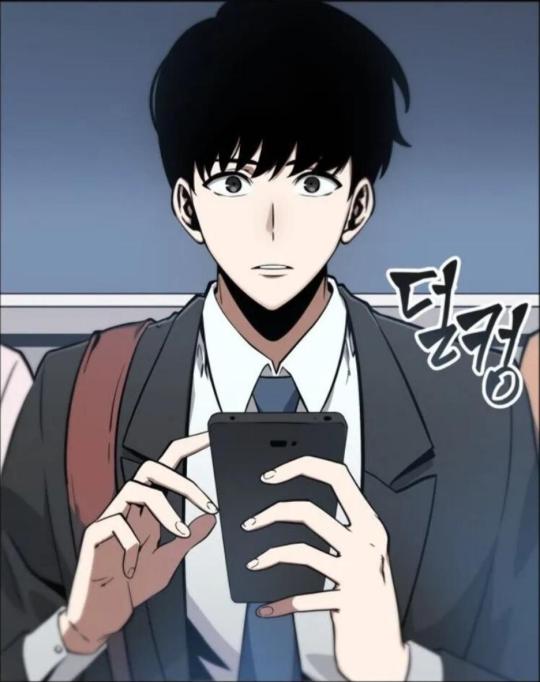
1. Introduced as a bland everyman only made exceptional by circumstance, slowly revealed to be the most batshit, suicidally depressed, bisexual maniac in existence. Uses self-sacrifice like a tool and is completely unaware of how beloved he is by the people he keeps pulling into his fold because he is so deeply and utterly convinced that he is fundamentally unlovable. He's like sixty foundational traumas stacked in a trench coat and he's always sixty steps ahead of everyone else and he loves the people he chooses so so dearly and people keep calling him ugly even though he's canonically pretty average and holy shit dude get some therapy please
2. do NOT let the pretty official art fool u. this is the most average 28 year old salaryman going through the absolute most in the apocalypse. ORV is a story about the most average man on earth with the most mundane, depressing life. and one story that he read to cope with it all. he's just some guy, but he is also the most beloved specialest guy. not because he had some hidden talent. just because he loved a story ferociously and also he likes getting in trouble on purpose. he is the most unreliable narrator you will ever find. every piece of the universe loves him for his average stupid self. you will understand when you read 👍
3. GHBJNKML i am praying someone has sent him in but. unreliable narrator the most ever and also i just. love him so much. orv in itself is such a goo dnovel but like. kim dokja is the definition of love and the most caring person but also he's suffered so much and while. yknow we're introduced to him as a kind of nerd but like. listen he's so fucked up juts LISTEN
4.He looks like a neet-pulled office worker. Spoilers:
turns out to be one of the oldest things in the world and the only being keeping it going and alive. He needs to be there to keep the world going. Also, he got like kind of adopted by Persephone and hades. Like his blorbo is real and in love with him. But this man looks so average that people call him ugly to his face just because he’s surrounded by absolute gorgeous people.
86 notes
·
View notes
Text
okay. collection of disparate thoughts on the good hal/bad hal thing:
-> I get, mechanically, why they went for it as a creative decision. I can buy the hal we see in the cutler flashbacks and the hal we see in the present day as being the same person because they're separated by sixty years, people change with time, but clearly what they wanted was for hal to go full villain mode in the last episode, and simply making him have a breakdown and do a heel turn on his personality wouldn't make sense. and like, last episode evil!hal is really fun, he's a smug villain who does dance numbers and is blunt enough to deliver the show's thesis as parting wisdom, I see the reasoning.
-> but I'm not sure how much of that was planned from hal's introduction? he says things like "I've been so many people" and "you've got the wrong man, I'm not him anymore," but it always reads as more metaphorical until s5. hal always says "me" when referring to his Evil Self, up until the middle of s5 where he starts saying "him."
-> and because (in my opinion) this element was added for a mechanical function, it overwrites thematic ground we've already covered before. when george split his monstrosity off from himself and called the wolf "it," that was a problem he had to overcome; when mitchell tried to deny his own agency and say he wasn't in control when he hurt people, that was a flaw that got corrected. then in hal's case they flip the script and say it really isn't him who does the atrocities. they try to work around it a bit, having good!hal kill someone and feed in secret so he does have things he's responsible for that lead into the change, but it still feels weird.
-> I also get where this comes from, metaphorically. there is a trend in sci fi/fantasy of portraying addict characters with this sort of jekyll-and-hyde dualism, literalizing internal struggles and the way people change while under the influence of mood altering substances, you find shades of it as far back as medieval morality plays where an everyman's vices and virtues manifest into physical form to duke it out. I don't love it, but I see where the emotional core of it comes from, and I also think it works best when (like with jekyll and hyde) the story comes to the conclusion that the two aspects aren't ultimately different people, and that's not really what they do with hal. unless...
-> how different are good hal and bad hal, anyway? obviously their moral codes are different, but are they different people or two aspects of the same person? bad hal isn't a neat freak, but he shares good hal's passion for vintage showtunes and werewolves who visibly want to do him harm. he's genuinely distraught when lady catherine dies, he keeps up appearances with lady mary for 250 years, young leo gets right under his skin, and he was willing to let let tom and alex have a nice send off from him. and, as should probably go without saying, good hal can also be a bastard, too. he almost attacks people several times, he says awful things to tom, he recruits ian and hides it, he kills larry and hides it, he feeds and hides it even when directly asked, etc. if the show had had one more season, I think the obvious next step for this arc would be bad hal joining the gang and everyone realizing that he's still just hal. this isn't a stranger, their friend hasn't died, this is the same man they've been living with for months and he still thinks the lute is the coolest of all medieval stringed instruments. the only real difference is that now he's decided to stop trying, but he's perfectly capable of changing his mind back.
-> what actually is his deal? what, specifically, is the good hal/bad hal thing? other vampires don't do that, other old ones aren't like that, the closest another character comes is herrick's whole amnesia arc but that was because he came back from the dead. I've seen other people go through and track how hal does actually show a good number of symptoms of a dissociative disorder (traumatic early childhood, out-of-body experiences, some amount of amnesia, etc.), but given that he says he feels like "both" and "neither" of himself when the devil tricks them all into thinking they've been un-cursed, I think we're supposed to read it as something supernatural. the best headcanon I've got is it is a dissociative disorder but hal thinks it's supernatural so the devil took it away as part of the whole too-good-to-be-true thing, but I don't think that was the intention and the show leaves it super unclear, they just drop it in and expect us to roll with it.
#I think five seasons was as long as this show needed to be but I do kinda wish they'd gotten like. a last ninety minute wrap up special.#there are just enough unfinished threads in the second trio's arcs that I want to reach through the screen and tie them up myself#the bad hal stuff as mentioned above#the gang processing their absolute mess of miscommunication that went so badly that it summoned The Devil From The Bible#tom's 'I've killed loads of vampires. it don't change ya.' from the penultimate episode really feels like it needs to be addressed#as a parallel backslide from the ideal of humanity#alex's unfinished business. ik the webseries had her deciding it must be to defeat the devil#but that wasn't in the main show and it's still left hanging from the last we see.#let me go back in time and petition the bbc for a wrap up special or a half-season. I could pitch them my musical episode.#being human#marina marvels at life
13 notes
·
View notes
Text
An Introduction to my Whump Ocs: The Lord's Favorite
Ethan Everest-Mann is, quite literally, an everyman. He works at an office job, drinks black coffee, and is rapidly approaching his 40th birthday. He likes dressing in business casual, watches the news, and has minimal free time. He's, in literally every sense of the word, boring. The most boring, normal person alive - and he's perfectly fine with that.
But for some reason, out of all the people in the universe, the One Who Watches, Lord with One Thousand Eyes, The Great Devourer, Collector of Worlds, The Bringer of Endings, Keeper of Time and Space, Ro'tharoth, has decided that Ethan is, in fact, his favorite mortal in all the worlds. He adores watching him, loves seeing what he does and says, and has made a human form just to talk to him! Ethan is his blorbo, the bestest human ever (in his opinion), and he'll happily spend all his time watching him when he's not bringing ends to worlds and extinguishing stars.
However, he's getting a bit bored with the usual things that Ethan is doing. And what does one do when canon is boring?
You put your blorbo in Situations. You make AUs. You write angst.
So Ethan is plunged into a variety of Situations - everything from being kidnaped and sacrificed by cult, to being falsely accused of murder and forced to run from the law, to dying stranded in space. He doesn't know when the world will change - usually it's after he dies a horrific and gruesome death, but it continually does, and he can't even die to have the nightmare end. He's the plaything of a cosmic god he can't even comprehend, let alone understand, and his sanity is fraying just as much as his body is mutilated.
Meanwhile, Ro'tharoth is having the time of his life! His favorite mortal is now doing so many new and interesting things, and it's so much fun to watch him try. Using that mortal form, he even gets to help in the stories - take care of his favorite character, heal him up, talk to him - it's all fantastic. He's sure that Ethan is having fun too, because he always resets the world after the really scary stuff, and he tries to comfort him after every new au through their human form, or letting him talk to them after they die.
Ethan, is, in fact, not having fun.
It's the relationship of a whumper and their whumpee on a cosmic scale, of knowing you're a character designed to recieve torture and pain for someone else's entertainment or catharsis, and how that would feel. They have a really fun dynamic, and I can't wait to share more - their arcs are really cool, and I love them so much.
#whump#whump community#whump scenario#whumpee#whumper#whump oc#my whump oc#cosmic horror#cosmic horror whump#black comedy#diety whumper#god whumper#The Lord’s Favorite#TLF
55 notes
·
View notes
Text
Floyd and Rook's nicknames
So I was thinking about why our character in Twisted Wonderland has the nicknames of "Shrimp/Koebi-chan" and "Trickster" and I haven't seen anyone point out the obvious reason: It's because we're tied to Mickey.
Floyd's is pretty clear. Mickey's small stature is often pointed out by whoever is his rival, like Mortimer Mouse or Pete, and "Shrimp" is a nickname used for someone small. However, Rook's is a nod to Mickey from the late 20s-early 30s.
If you haven't done deep dive into the beginnings of Disney's Mickey Mouse cartoons, Mickey was more of a trickster character when he was first animated. He was cited in the early 1930s by writers of the time as "scandalous" and an "imp". He was about getting ahead in life and finding the fastest way that served him what he wanted. An example, in one of his cartoons from 1928, "Plane Crazy", Mickey flat out yanks a turkey's tail off just so he has a tail fin for his plane. No asking, no speaking, just sees the tail and TAKES it, ignoring the pain and embarrassment the turkey goes through because of his actions. Later in the same cartoon, while flying his plane, he asks Minnie for a kiss, she says no, so he pulls a series of scary plane maneuvers to try and get her to kiss him when he asks a second time. She says no AGAIN and he forcibly kisses her. Don't worry, he does get comeuppance for this, but comparing the image of Mickey we have now to his old self; there's a lot of cognitive dissonance.
Honestly, Mickey in his original conception before they started to change his character would fit more with the student body of Night Raven College rather than the student body of Royal Sword Academy. Late 1920s Mickey is selfish, mischievous, a bit of a jerk, and all about his wants first. It wasn't till a few short years later they started shifting his character to be more like Charlie Chaplin's Little Tramp character and lessening Mickey's more jerk behavior. Then, as time went on, he went from being like Chaplin's character to become more of an everyman archetype which is one of the roles we play as in game.
Considering that basis of the nicknames, I wonder if that's part of why we were picked up by the Carriage, but the Dark Mirror can't classify us. The cartoon that Twisted Wonderland (and Epic Mickey as well) references is "Thru the Mirror" which aired in 1936, which is a couple years into that start of his becoming more like a "Little Tramp" based character of being childlike and bumbling, but good hearted at the core. In short, we're tied to Mickey who, at the time of "Thru the Mirror" was in character shift, going from a character who would definitely fit in at NRC, to a more good-hearted character who may mess up, but doesn't really act like a villain at all.
Now this isn't to say we are Mickey, obviously Mickey is in the game and Yana Toboso has made it perfectly clear that all Yuus are valid as 'Yuu' is supposed to be whoever the player wants them to be. I mean, personally speaking, my character is NEVER going to change from what I set her up to be (WHICH IS DEFINITELY NOT MICKEY). I want to keep her the way she is and I have no reasons to change her (I plan to post about her in depth one of these days when I finally have time to get the art for her done and where I'm happy enough with it). I just find it interesting that our nicknames seem to be nods to our connection to Mickey Mouse.
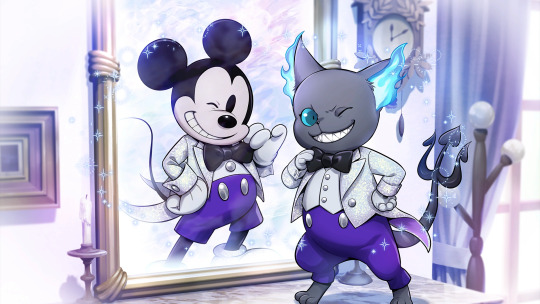
#disney twisted wonderland#twisted wonderland#twst#twst rook#rook hunt#floyd leech#twst floyd#nicknames#mickey mouse#old disney cartoons
33 notes
·
View notes